#[ cognitive functions/mbti/typing stuff ]
Explore tagged Tumblr posts
Text
guys... please help... I'm getting really into typology...
#weirdly enough the enneagram was my gateway drug#like i was AWARE of mbti but only got into the really surface level of it so thought it was like “eh ok”#but now i am learning about cognitive functions#AND OMG#EVERYTHING IS CONNECTED#like guys you need to watch jreg's autismophrenia video#bc like the Ne / Ni cognitive functions map on really well to his schizo / autism ends of the spectrum !!!#and idk enough abt cognitive functions to make a good commentary on that#BUR ONCE I LEARN MORE EXPECT AN ESSAY FROM ME#(also i do cringe a little every time i talk abt jreg's autism / schizophrenia spectrum bc sob urge to use names of mental illnesses#correctly. BUT IT'S FINE THAT'S THE MODEL HE MADE AND I HAVE TO LIVE WITH IT NOW)#also i have so much thoughts abt the enneagram#localscriptman's video series my beloved#and like OMG I FEEL AS IF I'M GATHERING AN UNDERSTANDING OF THE WORLD AAAAAAARGH#EVERYTHING'S CONNECTED. I CAN FEEL IT#(i hyperfixated on different typology type stuff before it's always such a fun feeling :3)#also the stigma around typology is slightly :( like YES it is a pseudoscience but it can still be useful!#(however also some ppl in the typology fandom do take it a little too far so fair enough i get the critics)#typology#enneagram#mbti
3 notes
·
View notes
Text
sylvie's mbti: ENFP
kaveh, hu tao, venti, furina, yoimiya: also ENFP
ITS ALL CHARACTERS SYLVIE WOULD GET ALONG WITH!! (terrible to put in a room together)
#[ im only doing this lightheartedly im not too deep into the whole ]#[ cognitive functions/mbti/typing stuff ]#[ but its still neat ]#OOC // AID TALKS.
7 notes
·
View notes
Text
I've seen a lot of posts arguing about who make the best bosses— ENTJs or ESTJs.
I'll make the distinction simple.
ENTJs have Ni as their auxiliary cognitive function. When Te is paired with Ni, it becomes an idea generating and implementing machine. ENTJs are constantly making and breaking new and old systems to make them more efficient. But making it work out in the long run, that's not ENTJ's forte.
That's where ESTJs come in. Si brings stability to the Te, so they run long term systems. They are grounded, and see no meaning in rebuilding a perfectly functioning system just for the sake of more efficiency. This can make them stuck in their own ways, but they can commit more than ENTJs.
See, Ni is the future and Si is the past. Both perceive the world in a different way. And both of them have shortcomings that the other is strong at. It proves that if both of them are placed in the right work environment which can bring out their full potential, they would both excel at their respective fields. There's no better or lesser in this case.
Hope this helped.
#16 personalities#mbti#myers briggs#estp#entj#typology#mbti types#cognitive functions#istp#mbti stuff#mbti things#mbti personalities#ask mbti sorted#mbti personality types#istj#isfj#isfp#intp#infj#intj#entp#esfj#estj#esfp#personality types
6 notes
·
View notes
Text








Why Fiyeraba Are Perfect for Eachother, According to science MBTI
Through their differences, authenticity, sense of what's right, and just overall being well-meaning people, these two are a great example of how you can lift someone up, just by being your most authentic self and holding space for them to do the same.
Hello, this is a Fiyeraba analysis no one asked for. It doesn’t contain any spoilers for Wicked: Part 2.
Disclaimer Regarding MBTI: I know many people think MBTI is bullshit and even a bit limiting, when we talk about real life, and the people inhabiting it, but in the case of well-written, consistent fictional characters (which applies to both Elphaba and Fiyero) I think MBTI can be used without worrying about negative effects. That being said, enjoy the analysis of Fiyeraba through this lense!
I.) Context, If You Are Not Familiar with MBTI
When it comes to MBTI, there are two angles of looking at the types. One you are probably familiar with is the four-letter abbreviation (ENFP, INTJ, ESTJ, etc), but there is a deeper layer, where we are looking at those cognitive functions that each type uses. There are 16 variations of the four-letter types, but only 8 functions, that vary in order, and preference in each type.
We identify four main cognitive functions in each type. Introverted types (their four-letter type stars with an I) are most comfortable using their introverted functions, and extraverted types (their four letters start with an E) are most comfortable with their extraverted functions. However as a person grows up, goes through life and evolves, they learn to harness their initially weaker functions better, and this gives them a more well-rounded personality, and a more healthier way of living in the world and be their authentic selves.
The order of the functions is also important, so whatever is in first place is their strongest function, and whatever is their last is their weakest.
You may be looking at this thinking “I didn’t ask for this”. And you are right, you didn’t, but bear with me.
So, lets sum it up: Each four-letter type has four main functions, and the extraverts are good at extravert stuff, while introverts are good at introvert stuff. Got it!
Now that we have this nailed down, lets look at these beatiful idiots then.


II.) Fiyeraba and Their MBTI Types and Cognitive Functions
Elphaba is an INTJ. INTJs are nicknamed “masterminds” by some people, because they are really good at big picture stuff. Ironically more often than not, if a story requires a villain with a large plan, they do tend to be INTJs. INTJs make for great villains in people’s eyes, with their no-nonsense way of going around in the world, and in a society full of rules and norms, they stand out, no matter what they do. Some people like to see Elphaba as an ISFP, that would mean that her introverted feeling is stronger than her intuition, but I think those people are wrong lol. Just look at the matter of seconds it took for Elphaba to realize that the Wizard is a fake once she was face to face with him, and then making a plan, and running away. Also, the trope of "you see me as a villain, so I will become your villain" is a common INTJ character trope, and applies to Elphaba super well.
Fiyero is an ESFP. ESFPs are nicknamed as “performers” or “entertainers”. They are usually popular, bold, original, and very observant. They are often considered as shallow, and superficial, which they can be, if they don't focus enough on developing their inner world, their intorverted feeling and their intuition. They are often impulsive, seeking newness, but they can easily fall into this superficiality as a routine, if they are not challenged.
Elphaba - INTJ - cognitive functions: Ni-Te-Fi-Se
(Ni) Introverted Intuition: Dominantly seeks deep patterns, long-term vision, and abstract connections for strategic planning. - Elphaba is the only one who intuitively sees Fiyero being unhappy. Later, as soon as her blinders of false hope are lifted after changing the monkeys, she almost immediately puts two and two together.
(Te) Extraverted Thinking: Structures external environments logically, focusing on efficiency and execution. - From information fragments she gathers at Emerald City, with her thinking supported by her intuition, she puts together the Wizard not having any powers, and seeing through his scheme.
(Fi) Introverted Feeling: Prioritizes internal values and authenticity in decision-making, though less visibly. - She has a strong sense of what's right, and would never chose what is good for her over what she thinks is the morally right thing to do.
(Se) Extraverted Sensing: Engages with sensory experiences and the present moment, though it’s less naturally prominent. - Once she decides she will fly, she does. She is very graceful, knows how to use her environment to her benefit, although she is a bit slow to take action.
Fiyero - ESFP - cognitive functions: Se-Fi-Te-Ni
(Se) Extraverted Sensing: Focuses on real-time sensory details, enabling adaptability, spontaneity, and a hands-on approach to life. - He's obviously an amazing dancer, and finds joy in the sensory experiences around him. He has no problems balancing on books, jumping off places, dancing, having good old sensory fun.
(Fi) Introverted Feeling: Guides decisions through personal values and emotions, fostering empathy and authenticity. - This function is somewhat dormant in him, although you can see that he cares very deeply for the animals, and feels the need to let Elphaba know that she doesn't have to be "galinda-fied". He appreciates her authenticity and it makes him work more on his own.
(Te) Extraverted Thinking: Organizes actions logically and efficiently to achieve tangible goals. - He is not booksmart, but streetsmart, he recognizes when it is safe to do something, and considers his environment before doing so.
(Ni) Introverted Intuition: Recognizes patterns and long-term possibilities, offering introspection and strategic insight when developed. - Him calling out Elphaba on her defense mechanism is a very good example of him tapping into his intuitive side, although he doesn't do it very often.
Elphaba and Fiyero have the exact same cognitive functions, but in a completely reverse order: Elphaba: Ni-Te-Fi-Se Fiyero: Se-Fi-Te-Ni I highlighted their strongest functions as seen above.
Now, as I mentioned earlier, whatever function is in first place is the strongest in a person, and whatever is last is the absolute weakest. And while the first and third functions are more easily accessible to everyone (due to them being extraverted functions in an extravert, and introverted functions in an introvert) the very last one, well, it’s difficult to learn to use.
For Elphaba her weakest function is (Se), that Fiyero is amazing at. (Se) can be used to assess your environment on a sensory level, to see and hear what is where, to notice details in how things look. People with well developed (Se) are great at the physical things, like doing your stunts, or dancing, jumping etc.
For Fiyero, his weakest function is (Ni), that Elphaba is just a natural at. (Ni) helps you see patterns in the world around you, and it has been described lovingly by people online as “being able to see the future” (does that ring a bell?) but also by recognizing patterns, seeing a big picture, usually noticing things that other people don’t.
So obviously those are two functions, that one of them learns from the other, right? I mean they just learn how to tap into them. Although they probably don’t as much learn from eachother, but see the other using it, and it makes their own relationship to this under utilized part of themselves change, and improve because of it. But while that is amazing, and will come very helpful to them in act 2/part 2 that is not the aspect that they connect through. What I really want to talk about is…

III.) Connecting Through Authenticity and Values - Introverted Feeling aka (Fi)
Look, you read those two words, you may think, okay, so it’s about people feeling things, like that’s normal, right? Everyone has feelings, so what’s the big deal? No, that’s not what it’s about. (Fi) is about what is _right_. It’s your values, that you hold so deep, that you can’t and won’t cut it out for anything or anyone. It what makes you you, and it is people with (Fi) that usually speak up for marginalized groups, and do the right thing, even if it comes at a personal cost. Introverted feeling is integrity, and it’s authenticity.
And as you can see, Elphaba has this in third place, and Fiyero has it in second. Fiyero should be amazing at this, but his integrity? It’s actually a bit… asleep. Why?
Looping is a phenomena that we call when an introverted person uses only their introverted, or an extraverted person uses only their extraverted functions. It’s a stress response. A defense mechanism. It’s unhealthy, and painful, because yes, your second (and fourth) functions are difficult to develop, but they are part of who you are, you can’t just shut them out, without cutting pieces out of yourself. Kids live with their first and third functions, and then it is believed that throughout teenagehood, we start to engage our second function more. But when something bad happens to us, we sometimes turn this second function off as adults or as teenagers, reverting back to childish behavior. It’s not for fun, and it never makes us satisfied.
Fiyero is looping, and the mindset he presents in Dancing Through Life is the textbook version of an ESFP in crisis. It is literally a song about that.
“Mindless” and “brainless” are not there to reflect on his lack of intellect, but the fact that he is not integrating these important parts of himself that he should to assess what is right, and he choses not to think about the world around him. He is skipping over that (Fi) as if it was another hurdle in his way, because probably, at some point he realized that his integrity and authenticity doesn’t really matter to the world around him. His values nobody cares about, despite him having everything handed over on a silver platter.
Escaping the Loop. When Elphaba steps into his life, and he sees her standing up for the animals, that’s the moment, she jump-starts this part inside him. He’s been literally sleepwalking through life up to that point. It is on the levels of authenticity that these two characters are allowed to truly connect, and it is this authenticity and integrity that allows them to see past everything else. (“It’s not lying! It’s looking at things another way.” IYKYK)

IV.) Growing While Lifting Eachother Up
For Elphaba, her personal journey is a strange one. She literally grew up in another bubble, but her integrity has developed. She is well in touch with her cognitive functions, but she is living in a lie, so her bubble is a lie. The fact that she could go through life for so long, not realizing that something was broken in the world, apart from how she was personally treated, goes to show you, what a good job the Wizard did with his manipulation.
Once she really first sees the problems in Oz is with the lion cub in the classroom. You can see her trying to fight for it, raise her voice, ask others to join in, to help and nobody responds, only Fiyero engages with her, asking “I’m sorry, we?” See how Fiyero immediately takes it upon himself, although he was not addressed directly by name, or in any other way. She looked in the general direction of her friends, and he was the only one who responded at all.
Elphaba, tries to solve the situation with her tried and true and tested intuition, integrity, thinking, but she lacks something. She bursts out emotionally, putting the class to sleep, safe for one Fiyero. She needs someone to show her how to take action in that situation, and Fiyero steps in. By that time, Elphaba helped Fiyero engage his values again, so he jumps in to help, and almost literally drags her with himself, moving her out of her comfort zone and out of class.
Up to this point Elphaba was told by Morrible to harness those emotions, but she also put a limitation on Elphaba with those classes. She thinks acting on those feelings is not always right, but these are not just emotions, these are beliefs and values and things that are actually important to her, so keeping them quiet is not the right path. But these two characters complement eachother, and bring out the best in the other, without pushing down anything in each other. They make eachother stronger and more capable. In the class, Fiyero pulls her out of the limiting mindset she put on herself, and other put on her, and they actually save a life together, and after this neither of them are the same again.
Fiyero starts thinking about what’s right. About the day with the lion cub, and the person he shared it with. He spends more time "inwards" and gives less care about the physical world, and what he thought was important before.
Elphaba leaves to Emerald City with Glinda, not realizing she will be tested, in more ways than she can imagine. And when, at the end of the day she faces a situation, where she needs to take action against the biggest odds she has ever faced, and with Morrible on the loudspeakers disparaging her, she doesn't listen. She doesn't allow those limitations back onto her, she just closes her eyes and leaps.
And when she does, Fiyero jumps on his horse, as the entire world is starting to close in around Elphaba, and goes to look for her.
I guess you could say that together they are actually unlimited.
#wicked#fiyeraba#fiyero tigelaar#elphaba thropp#cynthia erivo#jonathan bailey#jbaileyedit#wickededit#mine#mbti
328 notes
·
View notes
Text
ok. let's finally talk about this thing i've been wanting to go public with for ages
so i am not a fan of needing THC to help me curb the embarrassment i have in being happy talking about my real realll special interests, because perceived rejection of my interests feels like rejection of myself since i put so much of myself (my time) into them. i anticipate rejection from others because the stuff i find myself occupied with is detached, abstract, highly technical, or niche, and i'm aware of the surrounding cultural assumptions. some of them, and the level at which i am in involved in understanding them, are really specialized or esoteric, so even opening up about them is like "fuuuck im gonna be made fun of or it’s gonna be too technical that they zone out and dont understand why this is so meaningful to me" ive even posted about that feeling before.
see if i start accumulating too much self-context made in my own mind without sharing it i start to feel more and more isolated from other people around me, that they’re not seeing the full extent of what im seeing myself. i don’t share it, because i fear rejection or superficial judgments in other people’s eyes (probably because it’s happened to me and i’ve seen it happen to others). but at the same time it has to be shared with more people around me or else i feel like i have an intestinal blockage in my mind. what happens is my mental colon explodes from all the shit accumulated over time and vou get a post like this. i’m sorry for that mental image btw. anyway back the point of this post
anything where i can systematize archetypes in real, everyday situations has always been my strong suit. so when people ask me my hobbies im like ... uhhh what am i supposed to say? i analyze stuff about the world and rotate it in my mind. when carl jung wrote there are “as many archetypes as there are typical situations in life” i know exactly what he was talking about.
i’ve been toeing the line to really talk about this thing for two years, so let me tell you about socionics. if you already know what im talking about i love you. if you don’t (or even if you do, keep reading there’s probably stuff you don’t know in here), it is part abstract cybernetic model, part jungian concepts, part philosophy of information exchange. it classifies how people communicate and exchange information. it was created in eastern europe in the late 70s, developed primarily in the 80s-90s by other authors and it’s been an endlessly fascinating, elegant, and reliable tool for me.
usually people dismiss personality typology systems because the mbti became so watered down and pop-culturally saturated that people seemed to collectively take a stance of not taking anyone that genuinely cares about it seriously, or at least that’s the impression i got.
(btw — i need to go on this brief rant — i will never forgive 16personalities for being the big five rebranded and people thinking it's mbti. 16personalities gives you your big five type. they explicitly state on their website that they don’t borrow any concepts from jung. -A and -T don’t exist in the mbti and correspond directly to low and high neuroticism respectively. i figured out myself they mapped each letter dichotomy to the other four measures on the big five: extraversion (I/E), conscientiousness (P/J), agreeableness (T/F), openness to experience (S/N). which is stupid and it’s false advertising. take 16p and a big five test see for yourself how they match up. your personal mbti type can be different from its correlated big five type. the actual mbti using jungian concepts as a base is alright though. oh, and the best neo-jungian mbti stuff is by far michael pierce’d takes on it. if you actually fw that heres a carrd i created a few years ago about the cognitive function axes.)
but i always end up going to the bottom of the iceberg in anything i get really into, and i basically integrate it into my own understanding of the world around me for a while. maybe it was because i had a bad experience genuinely talking about it a few years ago from some people who made superficial judgments about it that made me sort of quiet about my interest in typology systems. i assume it’s because myers and briggs used the tool towards racist ends; it acquired negative connotations, bullshit intuition supremacy, and left the study of psychological types tainted in the united states. even if the individual’s study of the system is neutral, unbiased, out of pure curiosity as a way to classify and relate different personality structures to each other, as was the case with me. in addition to 16personalities being an invalid “mbti” test that bought their way to the front page of google, and rampant superficial information at all levels of study, finding anyone who was into it like me was basically impossible. the reason i have a preferred interpretation of jungian + mbti concepts is because i’ve tried different ones on and sensed how well they conform to reality as a way of describing phenomenon, ditching old ones that werent as clear. michael pierce’s i’ve found are the closest to what i sense jung's intentions were. (actually quite likely this is something i would attribute to being because all three of us are types LIl (and also all infj too, how about that?) brain-to-brain communication LII (carl jung) to LII (michael pierce) to LII (me)). so i felt like michael pierce kept the things that worked in real life and ditched the things that didn’t, leaving behind his elegant integration of the concepts.
anyway, i was under the assumption that anything that could be mistaken for it—which socionics often is at a glance—would be dismissed out of hand, even though it’s entirely different. plus, there’s all the context i’d need to clarify about how “it’s different from the “fun” unserious pop-psych mbti and also absurdly more technical” and what's the point in doing that if they don't respect you enough to hear you out anyway? so it just made me closed off.
they share a common ancestor though. the concepts are still based on carl jung’s book ‘psychological types’ which is why there is some shallow overlap, but the scope, structure, and application of it is different. i feel like this system is a lot more “living” and relevant to real interactions and communication between people in our everyday lives. i am always seeing specific examples of these concepts in play in real life and in characters depicted in media. it’s also been more empirically studied and successfully implemented over in eastern europe, and has gone under constant development and contribution. while since the 50s, mbti had crystalized and become stagnant with diverging interpretations to the point where it’s become basically meaningless to try to talk about because nobody can agree on concepts or semantics; there are virtually no distinctions between “schools” or “models” to differentiate interpretations — (although i have my preference for what i think are the most meaningful and reasonable one; as i said, that goes to michael pierce.) eastern (not so much western) socionics is incredibly more well put-together than mbti or kiersey for squeezing the potential from jung’s original ideas, and goes much deeper. that said, i will ALWAYS advise self-studying typlogy concepts over taking a test. the algorithm of a test can never possibly know you and your individual biases in interpreting the meaning of the words better than the knowledge you just have about yourself. if you learn the theory underlying it you will actually learn about yourself and others and it will actually mean something to you instead of a being an empty decoration for your profile.
here is a comparison chart i translated into english so you can get some idea of where these systems actually differ.
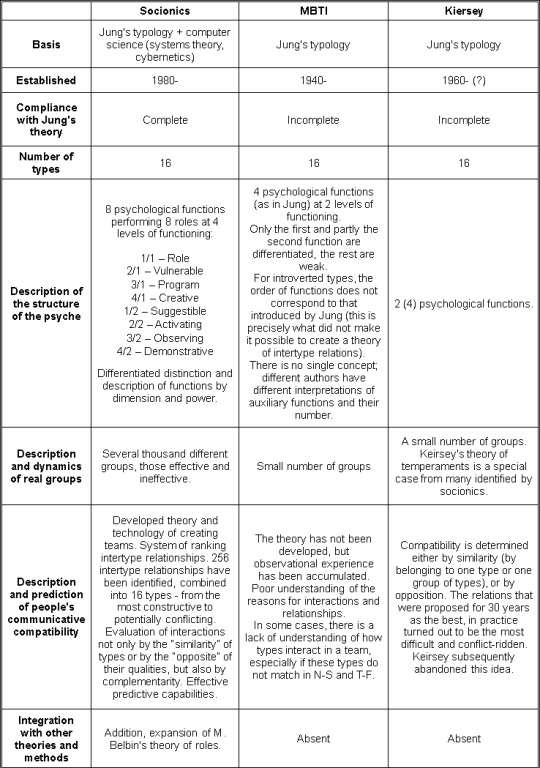
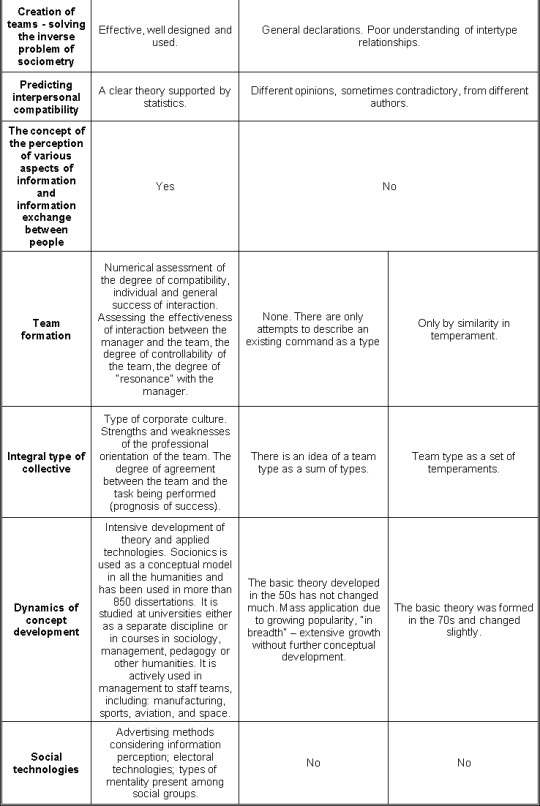
Букалов, А. (2019). On the advantages of socionics over other post-Jungian typologies. Socionics, Mentology and Personality Psychology, (6), 5–7. Retrieved from https://publishing.socionic.info/index.php/socionics/article/view/2603
for me it’s been super insightful applied to real life. it is like a toolkit for interpreting why some people just rub me the wrong way and our communication feels disjointed. or why some people pass my vibe check to enter my personal inner circle and i feel like talking with them is easier and not an uphill battle. who i feel drawn to and want to get to know better. to deconstruct why i and other people interpret information in the world the way they do, and how that explains the kind of people i end up curating in my life. it has put into words the concepts i haven’t been able to find the words for beforehand, and thus enables me to retrospectively pinpoint exactly what unconsciously makes people feel more at ease or why communication is just easier with some and why it’s harder with others, regardless of any other factors. there are other factors of course, that are the result of unique circumstances—nurture, culture, and upbringing—and i of course account for those, it’s not as pertinent to me as the framework that provides the skeletal structure regardless of those individual variations that are simply already a given for me. that was actually the whole point of its creation.
the system gives me a common language to communicate these ideas with, at least to the few people i talk to who have learned it, but i can adapt the concepts in how they relate to specific circumstances and convey it to a lay audience. i’ve been doing just that to explain why, of the people who have been made aware of the hs rarepair john-aradia, i have seen no one object to it, and instead, everyone i saw found it intriguing the more they thought about it, even when they initally thought was “so random”. and i realized, “hey wait! i know how to explain that!”, but that's in another post i've been working on.
[i was actually originally writing this post in the middle of said aradia and john analysis but i felt like there was way too much i wanted to talk about as its own thing. i figured people are going to be reading that post for john-aradia explanation, not public updates about my mind. i just didn’t want to rewrite this to account for the context because the point i made was still relevant]:
but now i’m thinking okay… i’m talking to a bunch of homestucks. why am i prostrating myself here? why am i so defensive? they’re probably creaming their pants at the idea of another symmetrically divisible system of classification to get their hands on. homestuck itself is founded upon a bunch of ideas with symmetrical divisions and classifications (divisible products of 2). aspect dichotomies, quadrants, cards, black-white, yin/yang and literally countless other abstract systems. if there is a common word to refer to these sorts of things, please let me know.
but in socionics terms, all of this sort of stuff i’m refering to would be within the domain of extraverted/black intuition (Ne) information, and classifying or positioning someone within those frameworks would be introverted/white logic (Ti). you can read more about these “elements” here. homestuck has familiarized you with notionally irreducible aspects present in everything, dual yin/yang forces permeating everything, so if you understand all of the sorts of abstract classification systems in homestuck you’re basically already 75% the way to fundamentally grasping model A socionics. it is way more structured and stable than the typologies in homestuck though. but you will perceive there to be similarities in the need for archetypal/thematic sense skills.
if you want to learn socionics, for the love of god start here. there are many weak places out there to start out with that will set you up with a faulty and loose understanding, but school of classic socionics is the best foundation to start with. i saw it emerge from the beginning when it was founded, having been part of it since late 2022.
this is an introduction to SCS, what makes it special, and and how differs from other socionics schools. i find SCS to be the most comprehensive, and i’m active within a side discord to discuss theoretical constructs related to model A. i’ve helped find the links between some concepts in model A that weren’t fully substantiated in augusta’s original works, specifically the importance of the asking/declaring reinin dichotomy, how it fits with regard to the rest of model A’s structure, how it underpins the ring of social benefit (which was missing from her writing), and how it can be used as an information element charge just like positivist/negativist can (i.e. all process types have positive asking Ne (+Ne? and all result types have negative declaring Ne (-Ne!). i’m still working on transfering my essay on that to a document.)
i know the intricacies of this system like the back of my hand but yeah i never post much about it because it’s so niche and i dont know who would even want to hear it besides people who i already know would, like in that small specialist group, but they actually been quiet lately even though i’m still active in there sharing things i realized. and i even feel alienated in most casual socionics discussion groups, especially larger ones. i need people who can match my freak about it.
because i have nowhere else to talk about it i’m starting to feel guilty yapping my friends’ ears off about it when i deconstruct everything i come across in light of this system like i’m being annoying about it. but at the same time when im doing that i am constantly reinforcing the merit of the system in successfully finding some dynamic i see in the drama of real life in connection to some idea from the model. i can immediately lock on to the core principles that are at play in any situation, validating the patterns that have been observed by others. by what measure do these people / characters / groups relate to each other, how do we define the specific “feeling” of the energy between them together? i could do a socionical analysis for anything that captures my interest.
it’s also been incredible for self-insight. i can now accurately explain my thought process.
i can change my perspective of the scope of my thinking on different levels. depending on the urgency of a situation developing around me and my respect for other people’s time, i can expand my reasoning from splitting hairs at the smallest pedantic specifics—although i prefer not to, to the most holistic global hard binary 0/1 (no/yes) judgment.
it’s fractal-like; once i know how to classify and compare the features of something to another, everything else with overlapping logical relationships instantly rises up in the same way, which of course is what leads to me having insights that reinforce the potential inherent in the things around me, because my way of thinking is isomorphic. i also experience strong animated mental imagery accompanying my conscious thoughts about these systems, minimalist shapes or lines of the barebones motion happening. i feel like my mental activity and what i actually write down is trying to capture what im seeing in my head.
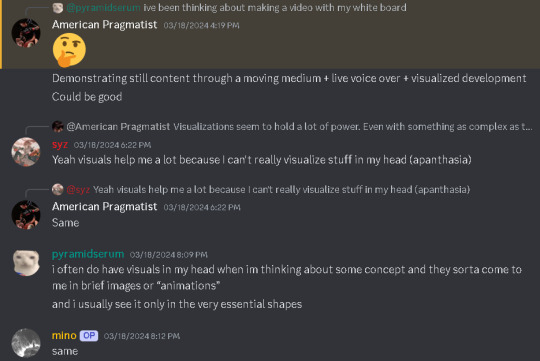
i prefer to be brief, but that requires sharing contexts with someone. once i've established similar ways of talking about the same thing with someone so that we’re on the same page, our messages basically become exchanging code words with each other. all of the potential densely packed into these efficient little terms.
the effect is that i am reducing the amount of time and energy i have to spend trying to explain things to someone. i just want to communicate easily and be understood by the people i talk to so that i can enjoy my time with them. this is why i felt like such a long, clarifying, in-depth post was necessary, which would rip the bandaid off and pull it all up at once, instead of on a private, individual-to-individual level. i had to have it engraved somewhere i could just point someone to instead of repeatedly having to explain the same thing over and over cause that’s a waste of time and energy.
in fact, that revelation i had about myself just now can be explained by model A too! my own type is LIl and this type’s id block houses the information elements +Te! → +Ni?, which aushra describes as “The quality of deeds and actions and the efficient expenditure of energy in work—only performing for what is truly necessary—leads to peace of mind in the future.”
or, for example, coming at it from another angle, here is an older post i made before i was even aware of socionics. i was already talking about my experiences, patterns of thinking and self-awareness in a way that was so on the nose for a socionics analysis.
is that not the clearest example of phase 2’s sensitivity (for me it is information about sensorics)? -Fi? → -Se! superego block, anyone? and did you see how much i gave attention to the time i spend working; +Te! -> +Ni? id block? [information element descriptions here]. you could also derive the progression of the information metabolism stages in my own psyche (phase 1: Ethics -> phase 2: Sensorics -> phase 3: Logic -> phase 4: Intuition).
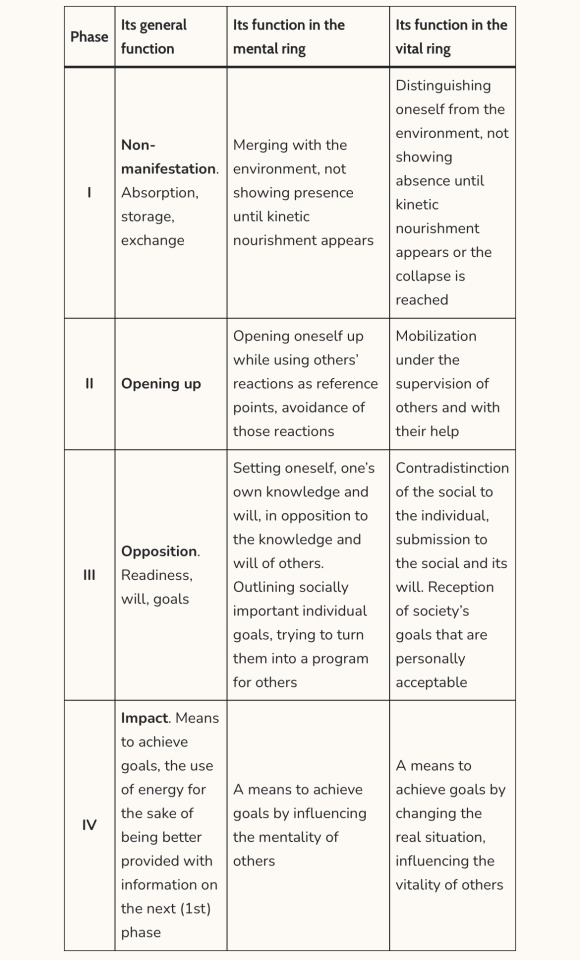
(from The Characteristic of SLI)
so through socionics it’s like i can find an explanation for just about everything i observe in others and myself just because i’ve extrapolated the logical relationships from that system and can isomorphically apply them to anything.
and i don't say that lightly! i'm not saying anything in this post lightly. like i have a degree in biopsychology from an honors college (ncf; yes, the liberal arts college desantis got his soulless hands on because it was “too woke"). having taken courses in statistics, research methods in psychology, and others, i know all about proper research design (and designing them myself). and of course i ended my four years there with my undergrad thesis, examining temporoparietal synchrony in autistic individuals when working alone and together, where for months on end i was doing nothing but reading and interpreting the validity of research papers. i even deconstructed poorly designed psychological constructs commonly used in autistic research in mine.
i also took personality psychology as a course during my time there. i got a birds eye view of most of the popular paradigms and still felt like i was more knowledgeable in the discourse behind some of the topics we glossed over since the course material was more of a broad comprehensive thing than an in-depth one for anything specific. in totality, all of the models i read about in relation to each other seemed so fragmented into different cuts and perspectives in trying to understand and find the patterns in people’s mental life. and yet none of the models i read about hold as as great of an everyday explanatory power as socionics does for explaining ways of thinking, people's proneness to certain tendencies, and the energetic tension that happens between certain people.
people can say otherwise that it’s pseudoscience. even though there are numerous studies built on real-world observations, the large-scale statistical data like from victor talanov. there's school of system socionics who emphasize its practice. it would be impossible to add all the evidence i can to support my claims to this post but you can see for youself - there are still countless new articles being published from different authors. regardless of that, even if it isn't accepted within the rigors of “scientific canon” i really dont give a fuck since it absolutely does indeed have explanatory and predictive power, and that’s all i care about. i’m confident in this not only through firsthand experience, the ability to frame what i know to be true about the real world within it and have it successfully describe those things, as well as talking to other people about my observations.
additionally, i see people make conclusions about interpersonal dynamics where they unknowingly repeat information that can be derived from socionics concepts.
something i noticed a LOT and ive repeatedly thought about and come to the same conclusion multiple times is that i think i naturally might "embody" the most optimal ways of interacting with other people for myself. it gives me insight into the nature of the personal relationships that i already procure in my life, but it’s not really a self-fulfilling prophecy because i dont use socionics to prescribe who i "should" be friends with. that's silly. thats a silly thing to do because people do have idiosyncracies that don't perfectly align with a system if you rigidly adhere to it, so you're bound to be set up for failure if you try to force that and you will be disappointed. it's better to let these feelings happen naturally without pretense, because that's where the observations that fuel my insight comes from.
i have a subconscious sense for who i will be able to get along with in the long term almost instantly without the need for any kind of system, just based on their actual mannerisms and “vibes”, but that alone is not good enough for me, i want to know why. socionics just gives me tools to figure out why so that i know what im dealing with and its not just ineffable energies, but i can put a name to those energies to think and talk about it and compare and discover patterns in what ive curated in my inner circle over my life, what i feel drawn towards. and indeed i do find plentiful amounts of recurring patterns. the simplification and abstraction is not to destroy the soul and expression of individuals but to wrap my head around them and understand them deeper in relation to everything else, including myself.
i am aware it can be confusing for many people which turns them away. but if theres any questions you have or youre confused about any concepts i can answer them
but yeah um, i’ve really only scratched the surface of this cognitive cybernetic tool. if you are genuinely interested in what i have to say and want me to talk more about it please openly tell me since i’m not a mind reader! i assume disinterest by default.
anyway if you got to this point thanks for reading. i wanted to just put it out there for context about any posts i make in the future. just stating my honest thoughts and whats been occupying my mind for the past two years.
be on the lookout for the john and aradia analysis soon where i’ll use it in practice to deconstruct some things about those characters. and if you’re coming to this post from that analysis after ive posted it, i’m sorry this post is so long in the middle of an already long-ish post. i just thought the context was important.
81 notes
·
View notes
Text
doing a better intro post since some stuff has changed
I'm Ray, short for Raymond, Rajmund for any poles. if your language has its own version of my name, feel free to call me that!
if you come up with literally any nickname ever somehow relating to my name feel free to call me that as well (Rajek, Raj @nwmcotutajrobie , Radek, Radzio, literally anything)
I'm a minor, I'm from Poland
my gender is Abed Nadir (comfortable enough in my masculinity to do whatever the fuck I want)
I use he/him pronouns but I'm fine with any jokingly (she/her like you'd call a fruity guy a girlie. y'know)
dni: if you're racist, homophobic, transphobic, if you support israel, if you support russia, if you think smoking/vaping/doing other drugs is cool, if you cannot restrain yourself from using "kys" or "kms" while talking to me
I'm bilingual (polish & english) and I'm learning german and japanese. I used to learn a shit ton of other languages but these are the ones that stuck with me :))
I'm neurodivergent, probably audhd but undiagnosed
I'm either an INTP or ENTP and I am very interested in MBTI and Jungian cognitive functions
shitpost tag is #radek ma przemyślenia
sideblog: @shark-spotted
I made an mcr ecosystem blog! @mcrastoycarsiown
platforms: my spotify, @/rosees3ray on pinterest & spacehey
my special interests are sharks, cars (particular models, usually old ones) and blur (band). blur recs are here
my favourite colour is khaki green
my favourite band ever is Wolf Alice (<333)
my favourite book ever is Solitaire by Alice Oseman
my favourite movie ever is Alice in Wonderland (dir. Tim Burton)
my favourite shark is the pyjama shark
I'm a child of Urania
I like music, reading, tea, drawing, skateboarding, old technology, cars, movies, flowers, astronomy, plants and posters
I'm interested in linguistics and languages overall, if you have any fun facts feel free to tell me!
I'm also very interested in accents in the english language, but I mostly speak in some type of british
I (try to) play the drums
I skateboard and cycle
I like taking photos, journaling, burning CDs and writing (I'm planning to maybe do music-related journalism in the future. if you're interested in reading anything I've written feel free to ask me about it!)
I go to school for maths-physics-IT
I'm a dad of 6 children (plants) and three dried rose bouquets
I collect CDs and toy cars
I have a dog, her name is Sara; I used to have a cat, his name was Kitek
my Best Friend is @ray-of-midnight-storm <333
my other good friends/favourite mutuals include: @sleepy-vix @achilleanauthor @trolliworms @myconidwitch @nonameidentified @rotisarychickenbutterfly @carbonbasedmatter feat. polacy rodacy: @nwmcotutajrobie & irls: @kiler-queen @mydlowaniliowe @argenvi @lambdirt @kawaiisususu and many others not mentioned here I LOVE YOU ALL
fandoms include: dead poets society, good omens, osemanverse, riordanverse, spiderverse and many many more (feel free to ask me anything)
my favourite musicians include: Wolf Alice (ofc), Blur, Radiohead, Queen, Lamp, Alex G, Hozier, Gorillaz, David Bowie, Talking Heads, Arctic Monkeys, The Last Shadow Puppets, Myslovitz, Kent, the Cure, MCR and many many many maaaaaany more (again, feel free to ask)
my favourite guitarists of all time are Brian May and Graham Coxon and my favourite drummers are Joey Jordison, Matt Helders and Joel Amey
blinkies!










89 notes
·
View notes
Text
A healthy dose of stalker Geto thoughts

a/n: FYI, thats the result if you lock me up in an empty room with my laptop and a playlist full of mareux, NIN and MSI. At least I got a newfound love for Closer now bc some years ago a fic ruined the song for me lmao
Before you ask, yes, I have mental problems. But likes and reblogs are still appreciated <33
wc: 1919
cw: geto is fucking delulu, online stalking, serial murder, poisoning, dismemberment, geto cooks his blood into a meal, implied bondage, kidnapping, reader was abused, corruption, reader is forced to torture and kill their abuser, gore
credits: nakatsuji sakutaro for one of my fave geto fanarts ever <33, my dearest @notveryrussian for proofreading, my criminal pedagogy teacher for some interesting details about organized criminals lol and arone_cosplay on tiktok bc his scream au cosplay was the sole inspiration when I started writing
The dark content is heavy with this one so there's nothing wrong if you won't interact with this post! If my horror enthusiast bestie says that this shit is scary, believe them. Minors are gonna get kicked, obviously.
He’s definitely not that “Joe Goldberg from You” type of stalker. He despises the guy, he watches that show to have a laugh. It’s his form of disaster tourism. Geto is almost the antithesis of Joe. I was a big fan of the first season of You so let me elaborate. Joe has a savior complex and he latches onto any conventionally attractive rich woman in his proximity and tries to mold them into his ideal type (which is vulnerable, dependent, innocent, and forgiving) and when shit hits the fan he becomes a whiney little bitch saying stuff like “aww, but I did this all for you :cc” because he’s in complete denial about his crimes and psychopathic nature. Geto is the opposite, and what makes him so fucking scary is that he doesn’t need to convince himself that his actions are right. He knows he’s right.
Also, he won’t put on a fucking cap and go out on the streets to stalk you. That’s just a dumb decision, he has a job to do, and it’s easy to recognize him. But that doesn’t mean that he won’t do it in his spare time, from a comfortable distance. He only needs one of your socials and digs up every little detail about you. Your entire lore. Pictures shared by your relatives when you were just a little kid, he tracks your friends’ accounts (he wants to make sure that you’re surrounded by the right people), all the locations, cafés, restaurants you share on your instagram highlights, your celebrity crushes, all the playlists you made on spotify, everything. He gets to know you before you’re even aware of his existence, you’re an open book to him before he talks to you. It’s so easy to get a feel of your essence in the online space, use the tremendous information to his advantage, surprise you, win you over with his fake thoughtfulness.
"Aw, you’re so sweet, how did you know?"
"Lucky guess."
Yeah, a lucky guess, he just scrolled your twitter until 4 am to reach your first ever post.
The easiest way to understand how his mind works is to look at his MBTI type and I’ll try to hold myself back to not flood you all with my everlasting love for Jungian psychology and cognitive functions. INTJs are meticulous, skeptical, analytical, practical, everything is centered around a bigger, more complex system, a spiderweb of thoughts. Their subjective ideals and values have the utmost importance. They get lost in the details sometimes, but they manage to prioritize creativity and rationality in their actions and thought process. So, if we want to pick a category among murderers, he’d definitely belong into a mission oriented type (canon is my only proof for this). He couldn’t care less about money, power, or satisfying his needs for control. He’s the personification of punishment in his mind.
Evil is petty, he is petty, but not so much to just deal with every single nuisance in the shape of a person (looking at Joe again lol). He won’t go after the Karens at your workplace or the shitty classmates who just wanted their name on your assignment without any contribution. If he kills, he must kill for a valid reason and does it brilliantly. Calm and level-headed, organized, devoid of anger or any intense emotion. He makes awful lot of preparations for a kill. He studies the victim just like he studies with you. Their schedule, relationships, habits, social media presence. He’d rather arrange the scene to give the impression of an accident. Mixing cleaning products, fucking around with the heating system and letting them die of carbon monoxide poisoning or a house fire (an easy kill if the victim smokes). He rarely lets himself get carried away and get all bloody and gorey because he knows how much effort he must put into disposing of the body. But he does feel like a god during the process. That he rules over life and death. That he has the divine right to decide who should be removed from existence.
The only slightly risky thing he allows himself, is to put his earphones in and call you up while dismembering a corpse. Good thing that his grandma has no use for that big ass meat grinder, a literal jackpot for getting rid of the bodies. His voice is soothing, so sweet you can turn into a blushing and giggling mess, but you can still hear the loud chopping noises as he severs the body parts right at the joints. He shrugs it off that he’s just meal prepping.
You believe him, you don’t question him further. But he does cook a delicious meal just for you and sends it to your workplace. And you have absolutely no idea that he was thinking about cutting up the ingredients with the same knife he killed his victim with. Luckily, he changed his mind. You don’t deserve to have any remnants of a lowlife in your system. But the idea was nice, just like how modern witches tie their favorite person to them. There’s something ritualistic about blood consumption in his mind that he can’t explain. Hopefully, a few drops of his own didn’t ruin the meal. At least you weren’t complaining about the metallic taste. He doesn’t mind he has to live off on two cans of Monster because he pulled an all-nighter. You’re falling head over heels for him so it’s worth the suffering.
The only thing that makes his heart ache is that as your relationship develops, he must use you to forge his alibis. He immediately copied the keys to your apartment, without your knowledge of course. Sometimes he drops by when you’re absent, goes through your stuff, sniffs around, looking for trinkets. He comes over specifically when he plans to kill his next victim. Sneaks out in the middle of the night, kills them, then goes back to your place and crawls back next to you. And he’s as silent as a cat, as a phantom, as a ghost.
He’s a fucked up man in every aspect. You think he’s too hyper fixated on restraints and bondage. He’s far too keen to spend an excruciatingly long time arranging the rope in an aesthetically pleasing way, or have the gag’s and blindfold’s colors match perfectly. His creativity and imagination are running wild when you’re the rigger. You almost question his sanity when he asks you to use cable ties and masking tape on him. What does he want? To feel tortured? Deep down he’s fascinated with the feelings a potential victim might experience. A taste of distress, vulnerability, helplessness that he usually has no chance to feel, yet he’s thrilled about it. You still won’t suspect a thing, everybody’s got a weird kink or two that they can’t explain, right?
He knows that one day, you’ll discover his secret. That he can’t hide it forever and even though he justifies his vile actions by giving it a noble cause, he must earn your forgiveness. He deliberately kept those who hurt you mostly alive. Whether it’s a bully, the shittiest ex known to mankind, or an abusive parent. He knows he has no right to kill them. But he can bring them to your basement, gagged and tied up. The best birthday gift ever is to let you have your revenge, right? Or maybe he just wants somebody as irredeemable as him, like he’s undeserving of anything nice in life so he must break it, tarnish it, ruin it. The world is a such a cruel place for kind spirits, he feels the need to corrupt them. Bring them down to his level.
He lined up a bunch of tools, a wooden bat, scissors, knives, razor blades, a hatchet, a hammer. He transformed the basement into a makeshift rage room. You don’t dare to cry, run, or scream at him, the person before your eyes makes you freeze completely, your features are distorted in dread. An old response got triggered, your nervous system remembers those years, you’re flooded with memories. You feel yourself regressing back to the victim you once were and that’s the process that Geto wants to stop once and for all. It’s so strange that you find safety in his presence and his firm hold above your elbows. He’s looming over you like a shadow, a shroud. Like the devil on your shoulder. Cooing in your ear to pick up something and have fun, let your rage cloud your mind, make them relive your pain. Don’t worry about a single thing because he will do all the clean-up. And you have no idea why, but you accept.
It’s strangely comforting. You feel in control, all-powerful, accomplished. It feels better than it should. It feels so right but it shouldn’t. There’s no guilt in you, only endorphins running rampant in your veins. The dopamine rush enslaves you, fills your brain with white noise. The pain does fade a little or something just irrevocably breaks in you. Maybe you’re just as fucked up as him and you managed to bury it in the deepest corner of your psyche. All bottled up for years like the most exquisite French wine, chained just like a beast but now it’s freed. Your reward is a bloody pile of flesh and guts that once was a person, and utter devotion gleaming in Geto’s eyes.
Your consciousness gets clearer, you notice the sensation of being drenched in blood and sweat when the realization hits you that there’s no going back. Now, you’re sticked together for life. You know his dirty little secret and now you’ve forged your own that he can blackmail you with if you ever want to get away from him. But why would you do that? You’re everything he needs and he’s all you have.
#i wanna write something kind and sweet after this one#this fic took a toll on me#i should blame the way i write povs#its kinda close to method acting but in writing lol#i try to think in character digging down in the deepest parts of their mind their pov is my pov#i literally warp my thoughts to get them right so you can guess how exhausting it is mentally to think and feel like such a character#jujutsu kaisen x reader#jujutsu kaisen#suguru geto x reader#the new fic im writing is a copjaku fic lol very kind and sweet indeed /s#jjk#geto suguru x reader#jjk headcanons#meesa writes
75 notes
·
View notes
Text
HOW TO MEMORIZE MBTI COGNITIVE FUNCTIONS/STACKS
okay, so we're all familiar with the intj, esfj, entp and all those stuff! 16personalities would say that those people are merely "introverted, intuitive, thinking, and judging" and same goes to other mbti types, but when you fall deeper into this mbti thing, you realize that there are cognitive functions!! and now you're crossed with introverted intuition (Ni), extroverted sensing (Se) and all those stuff; sure you're familiar with them now, but you're still stumped on how you'll be able to memorize it!
people often say them memorizing it just "clicks" with them someday. but what if i tell you there's an easier way to memorize it?
i'll now share you an explanation that is easy for me to understand; i hope that it'll be as easy for you as well and you can use this to your advantage!! i'll try to make it succinct as possible with additional visuals for easier understanding! (i'll exclude the explanation of what the E/I, N/S, T/F, and J/P are, since am sure most of y'all are familiar what they stand for)
---explanation below---
xxxO (J/P)
• dictates whether xxOx is an extrovert or introvert function • J = dictates xxOx is an extrovert function (Oe) • P = dictates xxOx is an introvert function (Oi)
Oxxx (E/I) [Dominant and Auxiliary Function]
• dictates whether which of the two functions (xOOx) are the dominant function and auxiliary function
The Tertiary and Inferior
• follows an alternating stack by reffering to the first 2 cognitive stack • Oi Oe Oi Oe - or - Oe Oi Oe Oi • inferior function is the opposite of dominant function: N-S, F-T; and extrovert-introvert • tertiary function is opposite of auxiliary function: N-S, F-T; and extrovert-introvert
ISTP:
I hope those make sense XDD
But!!! I'll provide some visuals to better understand it. Let's use ISTP, ESTP, ESTJ, and INFJ as our examples! (beginning of demonstration always starts with a "XXXX") [there's also an image description provided :>>]

ESTP:

ESTJ:

INFJ:

I hope this helps!!! You can ask me further about stuff related to this post if youre still confused, i'll try answering as best to my knowledge! (i'm still learning thou coz LDKSFDHSLGF)
#mbti#mbti types#mbti personalities#mbti personality types#estj#esfj#istj#isfj#estp#esfp#istp#isfp#entj#entp#intj#intp#enfj#enfp#infj#infp#cognitivefunction#mbti stuff#mbti cognitive stack#essay#explanation#tips#guide#text#gif#sxthee posts
17 notes
·
View notes
Text

a little rant (not shifting related) autism and stuff
something has unlocked since I received the autism diagnosis, something I might have been waiting for a long time. I’ve always been obsessed with discovering who I am but at the same time I wanted (and still want) to just blend in with the crowd and be like everyone else. I would take mbti tests and try to study my cognitive functions, convincing myself I was an xntp, but I later realized that it was probably the image I wanted to project to others, so I was lying to myself. I absorbed the personalities of all my favorite characters, who are sometimes the worst, and thought I had become that type of person, but I now doubt it was just an idealized version of myself. I still don’t understand who I am, but after this diagnosis I’ve become more patient with myself. I try to understand myself, figure out what I like and don’t like, what kind of people I enjoy being around, and what I want to do. I feel more understood, both by others because if I act in a strange way I now have a ready excuse and avoid making a bad impression knowing people will be more lenient, and by myself because I’ve finally understood why I’m so strange and complex. but now I like myself a little more. I know I can’t please and be liked by everyone, but I also know I’ll find the right people for me, and that, finally, I understand myself and appreciate myself.
#autism#actually autistic#autistic adult#rant post#mini rant#rant#motivation#neurodivergent#neurodiversity
18 notes
·
View notes
Text
My Thoughts on Popular Personality Websites
Inspired by conversations happening in the comment section of this post (shout out to @istj-mbti and @flayedsheep )
16 Personalities
Ah, 16 personalities, the enemy of the MBTI community… I’m joking… kind of. In all seriousness though, 16 personalities is really more similar to the Big Five personality types, than it is to MBTI. It can be a great tool… just not for understanding MBTI.
If you take it, you might get an accurate type, but more often than not… you won’t. I’m an INTP, and for the longest time, I always got INFP or INFJ on this test. My ISFP friend and ENFP friend both got INFP, and my INTJ friend has gotten variations, from INFJ, INTP to his actual type.
It has a big intuitive bias, and even though most of the MBTI community rejects this website, I definitely feel like this website is responsible for the intuitive bias present in the community. The biggest flaw however, is the disregard for cognitive functions.
And I get it. Cognitive functions are complicated and not everyone wants to sit down and learn the cognitive functions, and they really wanted to market this test for general audiences
I do think that alot of people who get into MBTI, start with this test, because it is so universally used in schools and jobs and stuff.
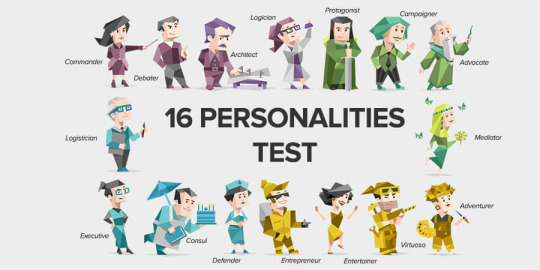
Personality Database
I have mixed opinions on PDB. Hypothetically, it’s a great place for discussions, when it comes to fictional characters, but like most MBTI forums it can turn sour very quickly, and it’s filled with people that have varied understanding of MBTI or enneagram.
Like, you’ll have a lot of adults who have been into MBTI for years and have a strong understanding of all the types, you have people who are just learning what cognitive functions are, then you’ll have teenagers who have just taken the 16 personalities test.
So in general, typings on that website are very hit or miss, but it’s a really great place to start when I’m unsure about a character typing, and want to see arguments other people have. However, I really hate when people use the typings on that site as the end-all-be-all of character types.
I mean, look at this?
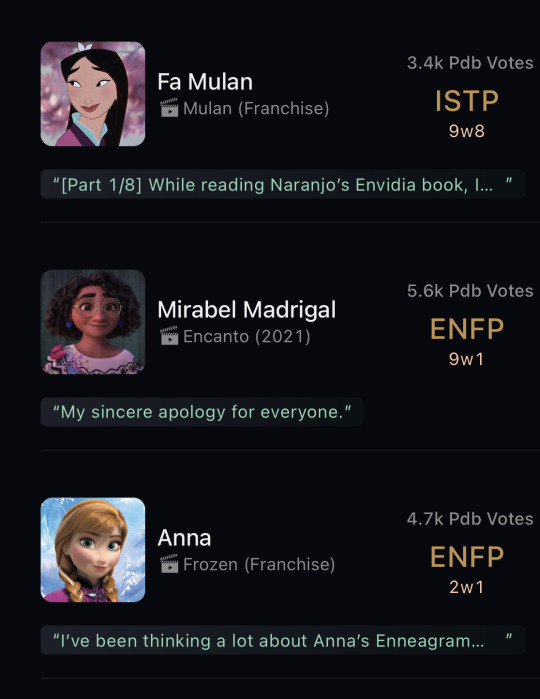
Anna and Mirabel? ENFPs? I don’t have a super popular opinion on Anna’s typing but… ENFP?! Really? Also, how tf is Mirabel ANYTHING but an Fe user?
I agree on the consensus for Mulan though.
Sarkinova.net
I do think that out of the majority of the MBTI tests online, this one is the most accurate, because it takes cognitive functions into account. However I do have a few concerns with it, the first being its so long lol.
I know that they want to get the most in depth understanding of a person, but a lot of the times, it just feels like they are asking the same questions over and over again, but with different wording, and that can make it frustrating, and a lot of the time, I don’t finish it.
Not to mention, even though this one is more accurate than most, there are always flaws with these types of test. No test will be in depth enough to understand you enough as a person to give you an accurate type. This is another test I’ve taken multiple times and have been given a different type.
Though I will give the test credit, this one has been given me my actual type before… so at least there’s that. I do think if you’re going to take a test, this one is a good one to take.
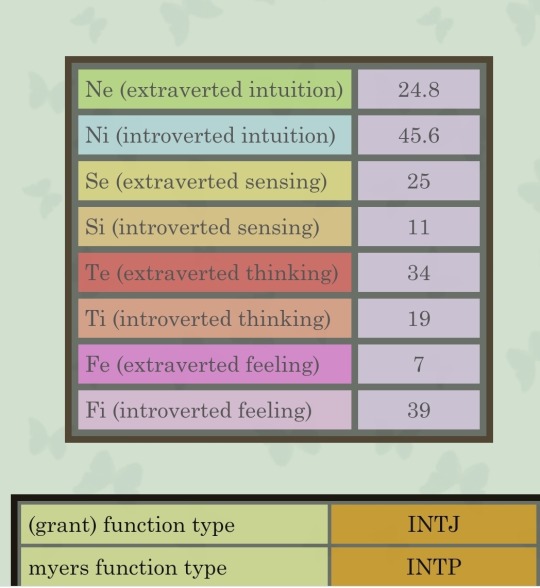
MBTI Online
No judgement… but I am begging people to not pay 60 dollars for this test. You can find ones that are just as good for cheaper, or even better yet, free. This test isn’t going to give you anything any other test will.
I do know someone who spent the 60 dollars, and still got mistyped by it sooo… yeah. If you really want to take it, by all means, go ahead, I just wouldn’t.
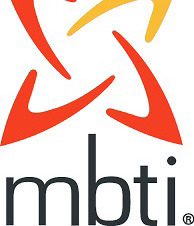
32 notes
·
View notes
Text
Stardew Valley MBTI x Enneagram: Alex
Following my last post about the Stardew marriage candidates and their MBTI types, I've been learning more about Enneagram, how it pairs with MBTI, and how it changes some of the typical characteristics of each type.
The Enneagram and MBTI complement each other wonderfully, providing greater depth and understanding of how a person interacts with the world [Cognitive Functions] and their motivations why [Core Desire/Core Fear]. So without further ado, here are my thoughts on each marriage candidate's Enneagram paired with their MBTI, starting with Alex.
Alex - ESTP 3w2: “The Ultimate Showman”
“ESTP 3w2 lives for the limelight and adoration. However, there’s more. The ESTP 3w2 is goal-oriented with a touch of generosity. They are the game-changers and dealbreakers. Because they have type 2 as a wing, they also want appreciation for their heroics. They turn the aggressive nature of the ESTP into something more entertaining to watch.” – Personality Hunt
Alex’s Core Desire: To be successful
The core desire of the ESTP 3w2 is to be successful. Alex's dream is to become a professional gridball player -- and enjoy all the fame and fortune that comes with it. He measures his success and sense of self-worth on external admiration and appreciation from others.
"You know, I used to want fame and fortune, but lately I've been starting to sing a different tune.”
“Yes... I know. That's why I've been so determined to be successful with my sports stuff...Make it or not... As long as I try my hardest, I think [my mom]'d be proud. Thanks.”
Alex’s Core Fear: To be seen as a failure
The core fear of the ESTP 3w2 is to be seen as a failure. Alex fears being viewed as a failure or worthless, especially by those closest to him. He perceives his sense of failure or worthlessness from external criticism or other's lack of appreciation [whether real or not].
“… [my dad] ruined everything for me and my mom… he'd drink all night and tell me I'm worthless, that I'd never amount to anything.”
“That's insane. You're just jealous that I'm talented and popular and you're not.” ---------------------------------------------------------------------------
How Enneagram 3w2 changes typical ESTP behaviour: New Strengths
1. Extra Charming
ESTPs are naturally charming, but ESTP 3w2s take this to a new level. Type 3s are excellent at persuasion and subtle manipulation, enhancing the ESTP's natural Extroverted Feeling [Fe] ability to woo and flatter others.
Examples:
“Hey, now that's what I'm talking about! You're cooler than I thought.”
"Heard you caught some kind of rare fish? I'm impressed. Your arms must be stronger than they look! pinch … not bad!"
"Hey, Farmer. Did you do something different with your hair? Something keeps grabbing my attention.",
"Hey, you look like you're getting into some good shape this summer! All that farm work is paying off, huh?"
2. More Helpful
Type 2s are known for being helpful, and because of this, ESTP 3w2s often find joy in helping others. Their motives might sometimes be questionable due to being type 3 but mature 3w2s can make generous and inspiring leaders.
Examples:
“If I ever make a lot of money, I'll make sure all my friends and family are taken care of. That means you, too.”
“I've been setting aside a few scraps for Dusty. He deserves a treat now and then.”
"Hey, honey! I made you a hot breakfast. If you want to get strong, you have to eat like you mean it!” "I'm still getting used to cooking and doing laundry… It's not exactly my favorite, but I knew what I was getting into when I married you." "There's a couple things around the house that I'm going to try and fix today. Don't worry about me, I'm not bored."
3. More Tactful
ESTPs are known for being blunt and tactless, but 3w2s realize that to help get what they want, being tactful has benefits. This only applies if they want to get close to someone or if it's with someone they respect. With everyone else, they typically don't care.
Examples:
“Oh wow...your shoes are a little dirty... but that's fine, too! Different people have different tastes I guess.” [Four Hearts] [Beach invite accept] "Of course you do. If you didn't I'd think you were crazy. Or some kind of nerd" [Beach invite rejection] "Really? You must be some kind of weirdo."
4. Better Work Ethic
The combination of Type 3 and ESTP makes them highly self-motivated and goal-oriented. As a result, ESTP 3w2s are true powerhouses of determination who go hard for their beliefs and stop at nothing to achieve their dreams.
Examples:
"I'm going to be the first professional gridball player from Stardew Valley… There's no doubt in my mind. I already led my school's team to the regional playoffs… Now I'm just training and getting stronger so I can claim my spot on the roster of the Zuzu City Tunnelers. You just wait!
5. More Disciplined
ESTPs aren't the most organized people, but because of the ESTP 3w2s' need to be successful, they are a bit more disciplined than typical ESTPs; However, they still tend to be scatterbrained in other aspects of life.
Examples:
“I'm going to do two hundred sit-ups tonight. I'm pretty dedicated, aren't I?”
“Oh, I almost forgot! It's my day for doing push-ups! Every time I do push-ups I try to do one more than last time.” “You have to work really hard if you want to achieve your maximum potential.”
“ My arms are really sore, but that's the sign of progress for a guy like me. I must've done a thousand push-ups yesterday.”
"Sorry my room is so messy. It's just hard to always remember to clean. I'm trying to get better, though."
6. Better Fashion Sense
Due to their primary function [Extroverted Sensing], ESTPs typically have an eye for beauty or aesthetically pleasing things. ESTP 3w2s, however, take their appearance much more seriously than just simple appreciation. Because type 2s and 3s are highly concerned with public appearances and reputation, ESTP 3w2s have a strong sense of fashion.
Examples:
“Did you get new pants? You're doing something right.”
“Did you do something different with your hair? Something keeps grabbing my attention.”
“If my hair wasn't so popular with the ladies, I swear I'd shave it all off in a second.”
"There's some weird people living in this town…like that guy Sebastian. Why does he wear black all the time? I don't get it."
New Weaknesses
1. Loss of Identity/Self-Awareness
ESTP 3w2s are masters at adapting to people's desires and emotions but they also risk losing their sense of self in others. As a result, ESTPs wear a facade for long periods. And when they have to drop the mask, they can't remember who they are.
Examples:
"I've started to realize that… well, that I've been really rude towards you in the past. You know, about going pro and all that. I guess I might not actually be cut out for professional sports… maybe it was just a childish dream… you know? " "Look at all these books. I haven't read a single one. Just the thought of cracking one open makes me nervous. But you can't make a decent living in this world without a brain…I'm worthless…"
2. Need for External Validation
Because ESTP 3w2s are self-image-focused, they highly value motivation and encouragement through external validation - it gives them the drive to keep pushing. The dangerous side is that they can view their accomplishments as less valuable if they don't receive recognition for their efforts. They can fish for compliments or get cranky if they don't feel appreciated. At worst, this can lead to serious self-doubt. But ESTPs are tenacious and will quickly bounce back regardless.
Examples:
"*sniff*... "Oh… Farmer. You saw me crying. ... "So… What are you thinking right now? "Well, there's no sense sitting around sniveling… let's head back to town. "Um… Farmer? Don't tell anyone I was crying. Okay?"
“Hey, can I ask you something? Do you think the ladies like my haircut?”
“Hey, I've been practicing twice as hard so I can turn pro and prove you wrong. You just wait.”
"Well, I'm not going to give up! If I work hard, I can do anything!"
3. Mild/Moderate People-Pleasing
"The need to be appreciated and to excel makes the ESTP 3w2s mild people-pleasers. However, make no mistake. The act of people-pleasing is only done when it benefits them. This personality type is always playing the long game. If people pleasing can get them there, so be it." - Personality Hunt
Examples:
“Hey Farmer girl. You've got a nice tan going. The more I practice this summer, the easier it'll be for me to go pro. Then you'd be able to say you knew me once. Cool, huh?” Hey, when I turn pro you can say you were my first "fan". Not bad, huh?
"Hey, you must be getting pretty strong working on that farm all day. Maybe you'll reach my level some day. Something to look forward to, huh?"
4. Chronic Workaholics
ESTP 3w2s have an incredible work ethic, but this can also be detrimental if they aren't careful. ESTP 3w2s who don't prioritize their health and relationships alongside their goals risk becoming workaholics. This is especially true if they become competitive or are trying to help someone else achieve their goals alongside their own. Their personal well-being and relationships often suffer as a result.
Examples:
“I've been trying to do more reading lately... I feel like I've been neglecting my brain for years because of my athletic obsession.”
5. Bad Financial Decisions
ESTPs aren't the best at managing money, and being a 3w2 makes this even worse. Because they want to impress others, they will often make extravagant purchases to look more successful or affluent than they really are. This can also apply if they want to appear helpful to others, giving expensive gifts beyond their financial means.
Examples:
“I got these new shoes yesterday 'cuz my old pair had a brown smudge. I just threw them into the garbage.” "Hey, Farmer. Before you head out…I hate to ask this… but can I have 5,000g? It's for a secret project I'm working on… I know we have a joint bank account, but I thought I should ask anyway."
"Thanks again for the money, Farmer. It was a fun project for me, and all the guys seem happy with it!"
------------------------------------------------------------------
Conclusion
Though it can be challenging to type Alex [or any fictional character, for that matter] with 100% accuracy, given everything we know about his character and his personal growth throughout the game, I believe is strong evidence to suggest that Alex is an ESTP 3w2.
His Enneagram type 3 desire for fame and recognition, paired with his MBTI cognitive strengths as an ESTP, makes watching his character transform from an arrogant, superficial man with an unhealthy obsession with becoming a professional athlete into a caring, supportive, and devoted friend/partner to the farmer incredibly satisfying. Do you agree that Alex is an ESTP 3w2? If not, what type do you think he is? Let me know your thoughts in the comments :)
--------------------------------------------------------------------- References:
Personality Hunt: ESTP 3w2 - The Complete Guide
#stardew valley#stardew valley alex#sdv alex#sdv#stardew valley mbti#stardew valley alex mbti#stardew valley enneagram#character mbti#character enneagram#stardew theories#character essay#estp 3w2#enneagram 3#mbti estp#estp characters
11 notes
·
View notes
Text
Hey, everyone! Today, I’m gonna do something quite different in this post. You may have gathered this from my pinned post, but I am heavily interested in personality tests and typing, most notably with MBTI and Enneagrams! But the reason why I have been invested in this is that I initially wanted to type each of the main characters in KINAC, most notably my one and only romantic F/O, Petal! It took many attempts, changes and difficulties, but I have indeed typed her with something that I won’t likely change.
In this post, I will tell y’all all about what I typed my F/O Petal as and WHY I typed her this way. I will be going over some characteristics of each of the types, including some very specific yet neat stuff, and how they relate to her! I might even do more personality analyses like this in the future, if y’all want! I won’t waste any more time here, so let’s get started under the cut!
(SPECIAL NOTE: I am making this blog post assuming that everyone who will read it has prerequisite knowledge of MBTI and Enneagrams, including cognitive functions and the function stack for the former; and wings, instinctual variants, and tritypes for the latter. I will brush over some of the listed topics as I go along, but I highly recommend familiarizing yourself with each of these topics if you haven’t already!)
(ALSO...I don’t really consider myself an expert in this subject per se, and there are times when I rush through things and might make quite a few mistakes. Feel free to correct me on anything or even give your own insight into what her type could be, if we have different opinions!)

Personality Typing Deep Dive - Petal
I think first and foremost, this prerequisite is required: what is Petal’s personality like? I will give a brief rundown.
Petal is considered to be motherly; she is protective of those she cares about and loves looking after them, especially Kitty. Petal is also very kind, caring, and enthusiastic to a fault...so much so that the other cats have gotten annoyed at her sometimes. Despite her kind and gentle nature, she knows when enough is enough, and is willing to put her foot down if it means justice.
Petal’s motherly nature makes her quite intelligent for a cat. But at the end of the day, she is still a cat. She doesn’t fully grasp human culture and behavior (often calling humans weird or unintelligent), and because of her cat instincts, she has done some pretty derpy things at times. And yet, despite not fully understanding sometimes, she does her absolute best to be as kind and respectful as possible.
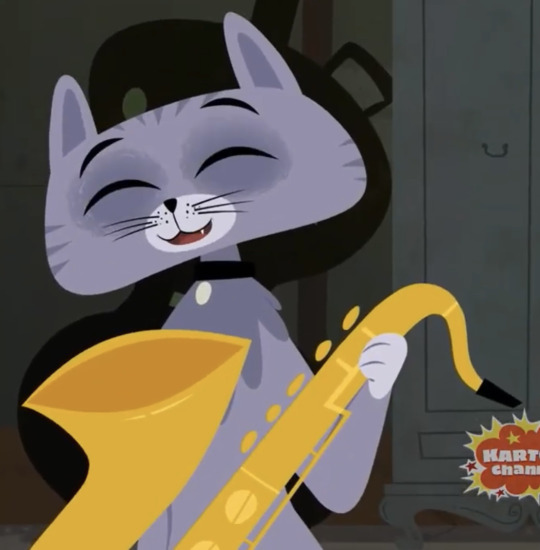
MBTI brief recap
The first of two personality typing systems we will use to type Petal is the Meyers–Briggs Type Indicator, or MBTI for short. MBTI, as y’all know, is perhaps the most famous personality typing system besides Zodiac signs. 4 letters with 2 possibilities for each of those letters each yields 16 different types one can be. Under the hood, 8 cognitive functions are each stacked in various positions in one’s mind, with varying degrees of consciousness. A function can be the driver for your decision-making at best (your conscious stack) or a demonic force of evil at worst (your shadow stack).
I personally wouldn’t say that MBTI determines your personality and personality traits as much as it determines your behavior and how you cognitively make decisions, due to these functions. Two people can be of the same type yet have entirely different personalities. As such, it’s more like a “blueprint” rather than a complete definition of one’s personality. Nonetheless, it’s an interesting way to see how different people behave in any given situation, whether they know it or not!
But enough waffling on...now that we know what Petal is like and what MBTI exactly is, we can move forward with her MBTI type!
After much deliberation, I have concluded that Petal’s MBTI type is ESFJ!

What does it mean to be an ESFJ? ESFJs are often called “consuls” or “caregivers.” They generally have strong practical skills and a sense of duty, and they are very loyal and can easily connect and flourish with others. They generally ensure that others are cared for, and they provide a warm and safe presence for them. However, they can also be too needy or selfless, and are sensitive to criticism. They can also be very averse to conflict and can have trouble with giving criticism, too.
Sounds like Petal, right? But generalizations and stereotypes aren’t good enough for explaining why she’s an ESFJ. In order to fully gather that, we must look at what’s under the hood: her cognitive functions.
Dominant Fe
Your dominant function can be thought of as the driving force behind your cognitive processes. It’s the one you use most often in everyday situations, and it’s your most trusted one when it comes to making major decisions. As an INFP, my dominant function is Introverted Feeling, or Fi. My Fi is about my inner moral compass; what I personally feel is right. As a Fi-dom, I want to go through life by staying true to who I am without having to conform to societal standards.
Petal, on the other hand, has Extroverted Feeling as her dominant function, or Fe. If Fi is about what’s inside, then Fe is all about the group. Fe-doms often have a strong desire to help people and make sure that everyone is involved. They love talking about their feelings with others, and they want to live in harmony with everyone. If there’s any motto for what things they do, it’s: “It’s what the people want!”
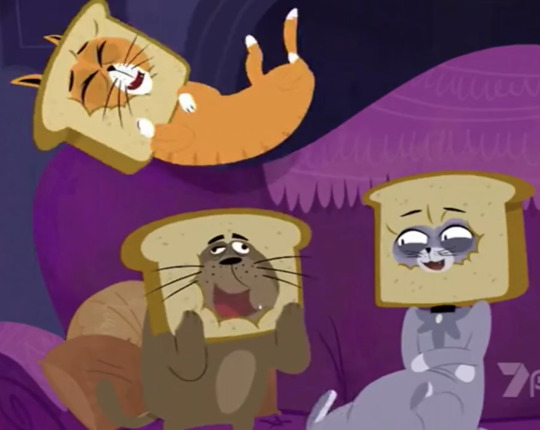
Sounds a lot like Petal, especially with her penchant for helping others! Petal definitely puts the desires and intentions of those around her before her own. In fact, she gets so caught up in the group that she often gets dragged along into any silly shenanigans they get into. For example, in one episode some of the cats performed a play about seeking buried treasure, and the cats including Petal, thinking it was fact instead of fiction, searched all around the mansion for it! I definitely imagine her thinking to herself, “Everyone else is doing it, so I should, too!” When they did find treasure and King Tubby took it all for himself and the other cats got mad, she did as well! There were many other instances of her playing along with the group, including investing in the stock market and playing tag.
But despite this, she knows when to take charge, and there are times in the show when she does. She isn’t always a leader-type, but when she is, she is very effective in telling others what needs to be done and how. (Although, this may be more of a Te thing now that I think about it.)
I want to touch upon this quote a bit:

“Hello there, I’m Petal. Most would refer to me as the motherly type, which is fine; I like looking after everyone.”
It’s the introduction she gave herself when she filmed a video. It’s a common stereotype with Fe users (especially Fe-doms) that they struggle with their identity. So, they turn to others to determine who they are. To put it in a quote, “I’ll be whoever you want me to be.” It’s very subtle, yet it says a lot.
But there is a certain episode in which I feel is where her Fe truly shines: “Petal Pushers”, the 43rd episode of the 1st season. At the beginning of the episode, Petal is shown to be very encouraging of the others, much to their annoyance. In one particular part, she was showing a flower to Kitty and Timmy Tom when Cheeta busted in and announced that he could touch his nose with his tongue, which he tries and fails at that moment. Now, he interrupted her, but did she get mad? Nope! Instead, she congratulated him for his “ability,” and encouraged him to try again! Miley was there and she got annoyed at her for not making him apologize. To which Petal responded:
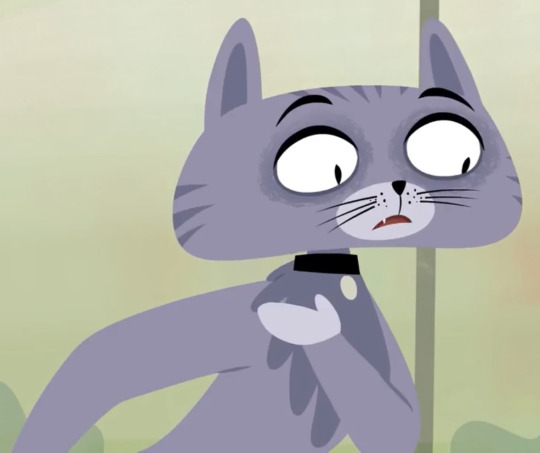
“Oh, he doesn’t need to say sorry! I’m only sorry I was doing something while he was obviously trying to do something very important!”
Later, Petal overhears some of the cats talking to each other about how annoyed they were with her, and that she was “too nice all the time.” Petal, initially distraught, decides that if “they don’t want nice Petal, they won’t get nice Petal.” So, she dons a leather jacket and spiked collar, and becomes mean. She throws food around, insults others, insists on watching hardcore shows, eats unhealthy food, and stomps around. Despite doing all this, she finds that it’s incredibly hard for her to be mean. She gets tired of keeping up the act, and finally drops it when the other cats apologize to her for taking her kindness for granted.

If you know your dominant function, you also know your inferior, opposing and demon functions. Could her demon Te have taken over in this case, then? I unfortunately don’t know enough about the demon function to accurately say anything about that. But some of her final words sum up her Fe well: “I just love you all so much!”
Auxiliary Si
Your auxiliary function is also an important part of your cognitive processes. If the dominant function is the driver, then the auxiliary is the guide, helping it out in making major decisions. My auxiliary function is Extroverted Intuition, or Ne. Ne is mostly about finding every possibility one can in the world. However, I mainly use it to enhance my Fi by coming up with ways I can express my values and identity.
Since she is an ESFJ, Petal’s auxiliary function is Introverted Sensing, or Si. Si is mainly about one’s past experiences, and how one can use them to deduce what could happen or what they could experience, so that they can be prepared for any situation. However, Petal doesn’t use this on its own; instead, she uses Si to advance the interests of the group and to assist others if they need help.
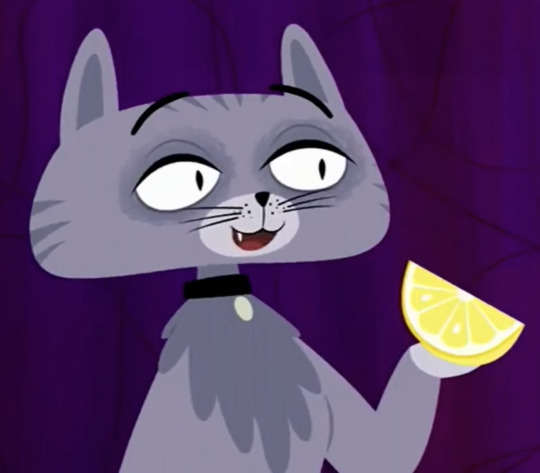
Petal is one of the first ones to offer any advice on what to do if a problem in her group arises. For example, when the cats experienced a blackout, they were stuck on what to do until the power came back on. She immediately said, “Oh, we can roast marshmallows!” and handed Cheeta marshmallows and sticks to use to “put them on the fire.” (He misinterpreted this and actually threw them into the fireplace.) In another instance, Timmy Tom couldn’t stop yodeling, which the others thought was a case of hiccups. She immediately exclaimed, “Oh, I have a remedy for hiccups!” and pulled out a lemon, which she made him bite down on. In summary, Petal helps others by using her own tried and true methods that she has learned over her life.
Unfortunately, there isn’t much else to say about her Si. As a result, I would like to go down a step in the stack to another function that can better explain exactly why Petal is an ESFJ.
Tertiary Ne
I personally believe that when it comes to typing characters, the tertiary function provides better insight than the auxiliary into what type they exactly are. The tertiary function aids you just like your top two functions, but it is often labeled as the “child” function. This is due to the fact that it is most often used in a “childish” or “immature” way, and isn’t entirely reliable in making major decisions. My tertiary function is Si, and I use it very differently than Petal does. I mainly use it to relax, by finding comfort in routine and familiarity. For example, I often become nostalgic when I rewatch old movies or listen to music I’ve loved over the years or even browse through old photos, as it reminds me of much simpler times. (This may not be the best example, but...yeah.)
Like me, Petal also uses Ne. However, I am much more mature about it than she is. Ne is about possibilities; as such, sometimes Petal is absolutely enthralled in the exciting and unknown...so much so that it can become a problem. If she sees a new thing that she likes or can be useful for her, she becomes obsessed.
One example of her tertiary Ne showing is in “Junior Rangers”, the 6th episode of the 2nd season. In it, a junior ranger troop leader explains to Petal the premise of being a junior ranger, including showing off some badges. She becomes instantly hooked on them, spending all night sewing together tons and tons of them...even though she initially planned for Kitty to become a ranger so that she can be taught how to behave like a human. She would end up giving them away basically for free, and it ultimately distracted her from the fact that cats cannot be junior rangers. Ouch...
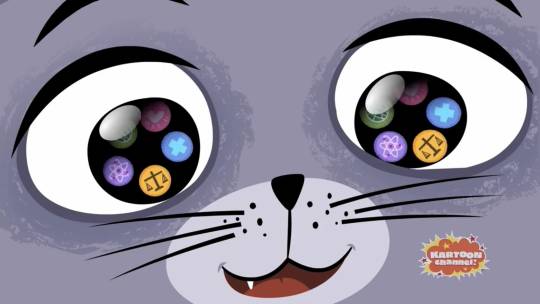
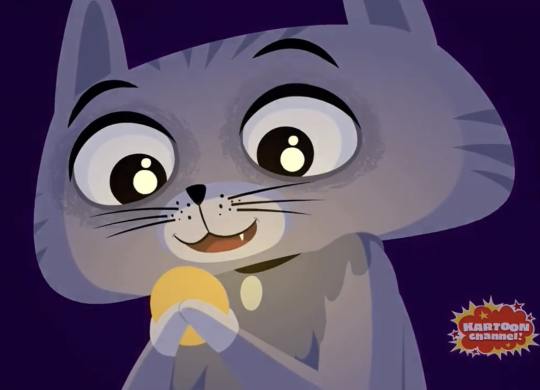
Miley: “Are you sure this is the right thing for Kitty, or are you just in it for the badges?” Petal: “For the badg–I mean, Kitty. Er, all for Kitty.”
But there is one dark side to the tertiary function that can really make itself known during difficult times, that truly cements how one can behave when it’s not used wisely: the dominant-tertiary loop. What happens during a loop is that your auxiliary function is completely ignored, and as a result you “loop” between using your dominant and tertiary functions with devastating consequences. As an INFP, I’ve definitely found myself in a Fi-Si loop before. The experience is different for all INFPs, but in mine, I become so paralyzed by my past mistakes that I retreat from everything and am deathly afraid of trying new things.
But as for Petal and her loop, let’s look at “You Can’t Handle the Juice!”, the 40th episode of the 2nd season. In the episode, Petal signs a contract and is the not-so proud owner of a bunch of boxes of orange juice. She is told by both the neighbor and a person in a video that she has to sell the juice, but it’s not so much selling as it is helping. Seeing as how she’s an ESFJ, she was enticed by that. She was also told to never take no for an answer. Hoo boy...
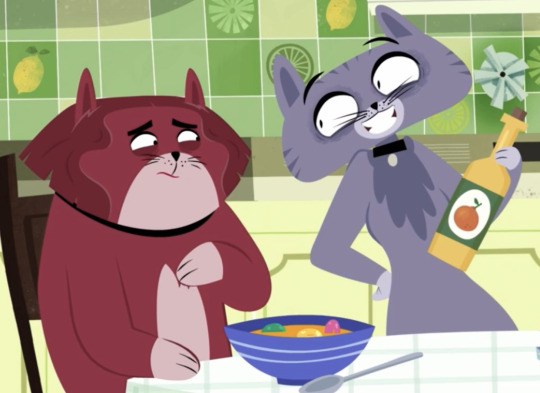
In my eyes, what happens next is a great example of a Fe-Ne loop. Again, the experience is different for each ESFJ, but here is how Petal experienced hers. Every time that a cat had a problem, Petal and her juice were to the rescue, or so she thought. Out of milk for your cereal? Use OJ instead! Stained your fur? OJ will clean it up! It doesn’t matter what kind of problem it is, she sees every single opportunity to just help everyone out using the juice. She’s not thinking rationally, but only how she can help. This juice can solve ANY problem, just you wait and see! The worst part is, she ain’t even realizing that she’s making everything worse! AND SHE’S GOING INSANE IN THE PROCESS! It’s what the people want, dammit!
Anyway...again, if you want to type a character, just think: what does their loop look like?
Critical Se
The last function I want to go over before I move on is part of the shadow stack. These are the functions that aren’t exactly a part of us. As a result, we tend to have no control over them, and they could help or seriously harm us.
One of these functions is called the critical function. If the auxiliary function is the guide or “nurturing parent,” then this one is the “critical parent.” In short, we tend to criticize and berate others when they use this function, or we criticize ourselves when we don’t. My critical function is Introverted Intuition, or Ni. If Ne is about what could be possible, then Ni is about what will be possible; Ni can be described as making one long-term plan and sticking to it, with no other options. Because this is my critical function, I tend to silently berate other people who limit my options. As a real-life example, my stepdad was talking to me the other day about my career in statistics. He said that I can be interested in applying my skills to various things, I need to apply it to one and only one thing in order to advance my career. Him saying this just made me angry. Why should I limit myself to only one topic? There’s got to be another way! I cannot live like this!

In contrast, Petal’s critical function is Extroverted Sensing, or Se. Se is often described as “living in the moment.” However, there’s more to it than that. In particular, one big aspect of Se is that it’s the experience you give to other people. Being aware of how your words and actions might affect others AND being able to use that awareness effectively is a possible indicator that you have strong Se. (As someone with trickster Se, I can’t relate, lol.)
If Se is in the critical position, what does it mean for Petal? In summary, she is often critical of people who leave a bad impression on her. If she is around to witness another person being rude, there is no doubt that she will criticize them for it. She has a strong sense of justice, and takes notice of any bad behavior or intentions in order to correct them. Not only this, but it may be that she criticizes herself when she leaves a bad impression on others, in the form of over-apologizing and having an “Oh, shit!” look when she makes a mistake.

“Pardon my French, Pierre!”
She also tends to be critical of habits that seem strange to her. Besides King Tubby, she seems to be the one cat that is the most critical of human culture and behavior. She even goes as far as to say that humans are weird and unintelligent. (As for how she fell in love with me, I’m unsure tbh.)
But overall, she is one of those rare ESFJs that know how to use their critical Se to their advantage. With it and her sense of justice, she knows how to give proper discipline to others and hold them accountable for their actions. This is just one of the core aspects of her motherly nature, and that is just one aspect that makes Petal who she is.
Enneagram brief recap
The other personality typing system we will use to type Petal is the Enneagram. If MBTI is how people behave the way they do, then the Enneagram is the why. There are 9 Enneagrams that each correlate to your core motivations, desires, and fears. Again, I wouldn’t say it determines your personality; it more so determines the reasons for you behaving the way you do. Just like with MBTI, two people can be of the same Enneagram type yet have entirely different personalities.
Despite how basic it may seem compared to MBTI at first glance, there are several complicated sub-topics when it comes to exactly specifying your Enneagram. There is the idea that you act like another type depending on if you’re in growth (integration) or in stress (disintegration). There is a wing, which is when you inherit traits of an adjacent Enneagram. There is also something called instincts, which reflect how you further behave, which can all be stacked into an instinctual stack. There’s even the idea that one person has 3 Enneagram types at the same time in something called a tritype! As stated in the beginning of this post, I am assuming you have prerequisite knowledge of all of these topics. You don’t have to be an expert, you just have to be familiar enough with them so that you’ll know what I’m talking about!
So what are we waiting for? Let’s type Petal! (The following descriptions are probably going to be much shorter than the MBTI ones due to the types being self-explanatory given what I said earlier.)
After much deliberation, I have concluded that Petal’s Enneagram type, including wing, instinct stack, AND tritype is 2w1 so/sx 216 (2w1-1w2-6w7)!

What does it mean to be an Enneagram Type 2? In summary, 2s have a core desire of feeling loved, and a core fear of being unloved or unworthy of love. How does that relate to Petal? Well, an extremely common way that 2s want to feel loved...is by helping others! In fact, 2s are often seen as the “helpers” of the Enneagram world. They are generally empathetic, sincere, warmhearted, friendly, generous, and self-sacrificing. However, they can also be flattering and people-pleasing.
I mean...this fits her pretty damn well, I think! One thing to note about Enneagram typing is that it’s not finding exactly what fits a particular character, it’s what fits a character the most. And 2 definitely fits her a LOT. In her own words,
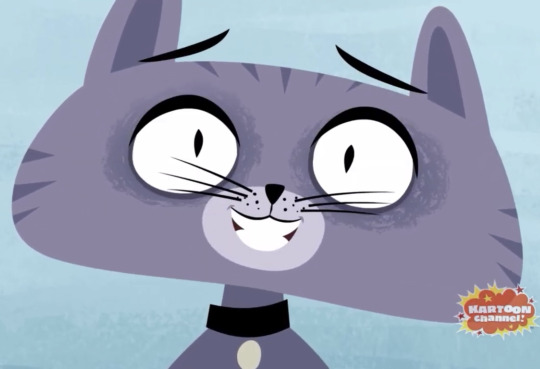
“Oh, I love helping!”
Does all of this sound familiar? If so, that’s because there’s actually a large overlap between ESFJs and 2s. Being helpful and compassionate towards others? Sensitive to criticism? Putting others before themselves, so much so that they forget their own needs? Yep, fits both of them well! In fact, a study done to find the correlation of MBTI and Enneagrams found that about 61% of ESFJs are 2s, and that about 47.5% of 2s are ESFJs. Very cool!
I feel like I really don’t need to say anything more here, since a lot of what was said about Petal in the previous sections can also be applied to type 2s. But let’s dive deeper into her specific wing, instinct stack and tritype!
Disintegration into 8
I want to briefly touch upon disintegration, or when you become so stressed that you inherit the bad aspects of a certain other type. This other type depends on your own type, but for Petal, she disintegrates into an 8, which makes her aggressive and domineering. She has been shown to get really angry at times, in particular when things don’t quite go her way or when someone left a really bad impression on her (critical Se!). In particular, she might cuss or insult others. She apologizes right after, however. (Now that I think about it, this may not be true disintegration...then again, maybe her becoming mean in “Petal Pushers” was?)
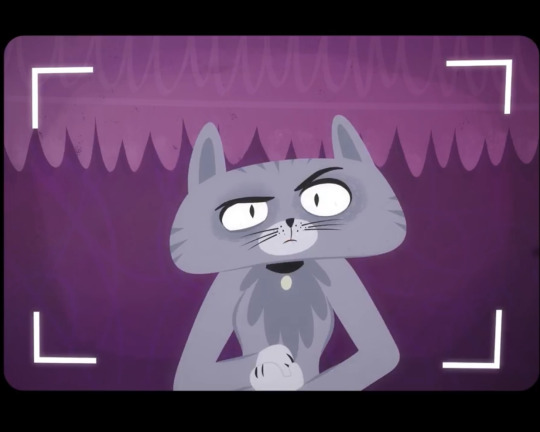
“When I’m underappreciated, I kick off!”
1 Wing
Enneagrams can also be split up into 2 “wings.” In short, a wing is something that enhances your type by inheriting characteristics of the adjacent type. If what you desire in your primary type is your end goal, your wing can be seen as HOW you achieve that goal.

Keeping that in mind, there are 2 possible wings for the helpful type 2s: 2w1, which incorporates the 1s’ sense of justice and perfectionism, thus wanting to achieve being loved through being prim and proper; and 2w3, which incorporates the 3s’ sense of ambition and goal-setting, thus wanting to achieve being loved through being successful. I mentioned Petal’s sense of justice before, which already makes her lean towards the 1 wing more. But let’s briefly dive into some differences between these two wings:
2w1s are more concerned with doing the right thing, while 2w3s are more concerned with keeping up a good image. Petal seems to genuinely care about others and wants what’s best for them.
2w1s want to be loved but being proper is almost more important. There have been times where Petal has spoken up about things needing to be done in a proper way. 2w3s, however, want to be loved and there could be nothing stopping them. They can be manipulative and competitive, and will try to help everyone.
I saw an analogy on Reddit that really sealed the deal for me: imagine that two 2s are about to serve a dish to a group of people. 2w1s will make the absolute best dish they could think of in the hopes that everyone will love it. 2w3s, however, would make everyone’s favorite dish to prepare it for every individual person. The first one definitely fits Petal better; in fact, she has served one appetizing dish to the other cats, and all of them loved it.
Knowing all of this, I can confidently say that Petal definitely fits the 1 wing better. For her, it’s not about success; it’s about being good, as well as her genuine love for those she cares about.
SO/SX Stack
Enneagrams can also be divided into 3 instinctual subtypes. The 3 instincts can be thought of as “survival mechanisms” for how to make it in the world, whether alone (self-preservation), with a partner (sexual), or with a group (social). Everyone has these instincts, but like the cognitive functions of MBTI, they are “stacked” to varying degrees of importance in one’s mind. There is the instinct that is sought, the one that is a resource, and the one that is ignored. Although instincts are different for each and every Enneagram, the core idea remains the same.
NOTE: Wings and instinct stacks DO NOT and SHOULD NOT affect each other! You can be of ANY wing and stack combination!
Knowing each of the instincts, I think it’s safe to say that for Petal, the self-preservation instinct is dead last in her stack. I don’t need to say again that she is mostly influenced by the people around her, and that she often does certain things only because everyone else is doing it. The question is...is Petal a social 2 or a sexual 2?
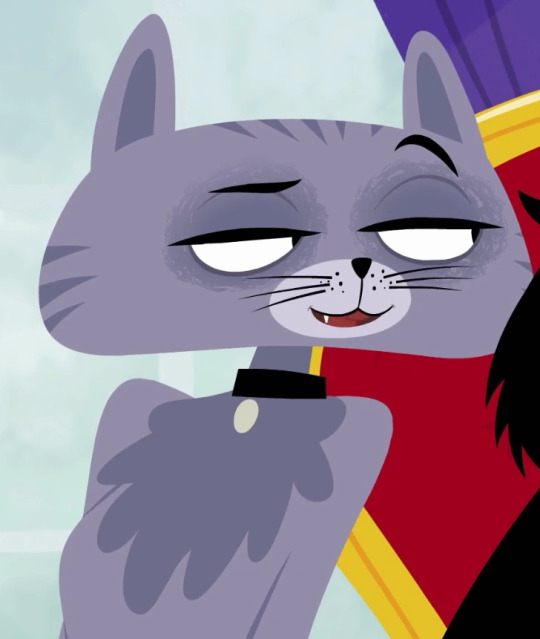

The way I see it, instincts enhance your core desire. On the one hand, social 2s want to feel loved by a group of people. They often are supportive and overextend themselves for the group in order to gain influence and love in it. On the other hand, sexual 2s want to have a partner to feel loved by, and can be seductive or manipulative in order to achieve this. In addition, people with the SO/SX stack tend to appear friendly and lighthearted on the outside, while those with the SX/SO stack can be energetic and enthusiastic, yet intense and impulsive. With this, I think SO/SX definitely fits Petal more.
216 Tritype
And last but definitely not least, comes the tritype. As stated earlier, there is an idea that people are of 3 Enneagram types (and wings!) at the same time, ALSO stacked based on importance! There are restrictions when it comes to what possible tritypes there are (specifically, you must have one type from each Enneagram triad), but each of these types work together to form a cohesive framework into what motivates your behavior as a person.
When figuring out Petal’s tritype, I was conflicted as to whether she was a 216 or a 269. What I was hung up on is the 1/9; does she strive for peace and harmony, or perfectionism more? To answer this, I decided to take a look at the two tritypes as a whole:
126s’ greatest ability is to be there and serve others when they need it, while 269s are excellent at dealing with conflict. Thinking about it, Petal definitely takes on more of a nurturing, protective “guardian” role more so than a “mediator” role. She can often be seen in the show doing chores around the house, helping out whenever it is necessary. It’s very important for her that any chores need to get done, and that others are responsible for their behavior. 9s in general tend to be very passive and have trouble asserting themselves, and let’s just say...Petal asserts herself when it’s right.
For example, in “Kitty Copy Cat,” the 28th episode of the 1st season, Kitty starts copying Miley’s behaviors, and the latter gets extremely upset. So she and Luna decide to get back at Kitty in order to get her to stop. They end up making Kitty angry and she storms off...but Petal witnessed the entire thing. And so she gave it to them straight.

“Ahem! Can someone please tell me why Kitty just ran off dressed like a rebellious teenager? Imitation is the highest form of flattery, and being catty is the last form of cat-havior! I expect better of both of you! Just fix this!”
Knowing this, the choice is very clear. Now that we have her basic tritype, we can go over her specific tritype: 2w1-1w2-6w7. If you know about the wings of types 1 and 6, it is clear that her wings are somewhat obvious. Her 1 has a 2 wing, as she is more inclined to make the group around her better by helping others be prim and proper, at the cost of her own needs. The last in her tritype is 6, which is about wanting to be safe and secure. Petal does seem like the type to want a safe and peaceful life, and she ensures that others are safe as well.
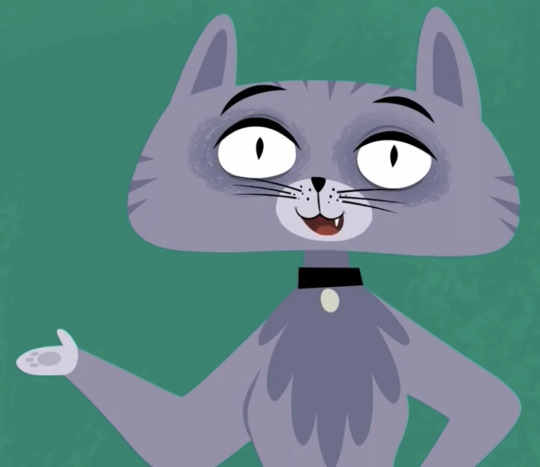
“I’m Petal. I’m looking forward to building a shelter, and making sure everyone works and plays nicely!”
One of the biggest differences between a 6w5 and a 6w7, though, is that the former wants to appear capable and competent, while the latter wants to have fun every once in a while. On occasion, Petal will definitely have fun, either dancing in one of the cats’ many cat parties, or going to a large social event, such as a craft market. Now that I think about it, 6w7 fits Petal infinitely more than 6w5; she is more social, remains optimistic, doubts herself more, is often pulled along with the group, and sometimes enjoys new ideas. There is absolutely no 6w5 in her. There’s no 5 in her whatsoever, even.
And we have covered pretty much everything! I may have missed some things worth noting, but I have covered the major portions pretty well, I think! But no matter what, even though Petal may be typed as an ESFJ 2w1 so/sx 216 (2w1-1w2-6w7), at the end of the day, she isn’t defined by any personality typing system...she is defined by who she is as a person. She is kind, caring, motherly, enthusiastic, and has a sense of justice. She is my lovely lady, my beautiful bride, my wonderful wife. Petal...is Petal. And there’s no changing that.

And that’s all, folks! Man, this was an insanely fun post to make! In fact, this may not be the only Personality Typing Deep Dive I make; if it’s requested, I may do one of these again, whether it’s for any of my non-romantic F/Os, or even other KINAC characters! If y’all think this is something you want to see more of in the future, please let me know!
Until then...see y’all in the next post! I love you so much, Petal!
Proship/comship DNI.

#kitty is not a cat#kinac#selfship#self ship#selfshipper#self shipper#selfshipping#self shipping#selfship community#self ship community#f/o#f/o community#personality typing#personality typology#mbti typology#enneagram typology
13 notes
·
View notes
Text
Just a quick ramble about bllk chapter 254 and stuff related to MBTI:
The part when Isagi begins to explain in detail the two types of ego really piqued my interest because to me, it sounded a bit like cognitive functions-

"Self-Style" ego type ressembles/is based on Introverted Feeling (Fi). This function works by making internal and subjective analysis of things, which results in the user's personal values, and likes or dislikes. Later on, this results in motivation.
As this analysis is completely subjective, it doesn't always align with society's values or expectations.
Now, for the other type...
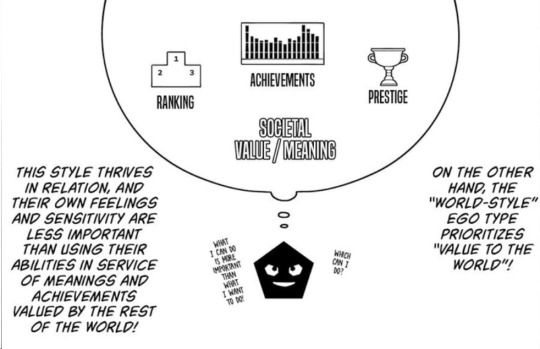
I would say this Extrovert Feeling (Fe) or Extrovert Thinking (Te), although I'm leaning more onto the first one. What both of these have in common is not focusing on one's own values or feelings when making decisions (unlike Fi). I think that Fe might be a better match since we're mostly talking about external values instead of logic.
#sooo that's it#opinions?#bllk#blue lock#isagi yoichi#bllk manga#bllk analysis#mbti#blue lock chapter 254
23 notes
·
View notes
Note
Here's the PERFECT person for you to type:

Because there's no way his type has changed so much T.T
You told me types don't change, so I wish an expert told me his actual type! Based on functions and everything, you know the stuff... they insist on taking these internet tests and they make less sense every single time...
LMAO THE BOY FROM THE GIF ™
i'll be really happy to type him if you give me a small quantity of 500 reais :D /j
no but talking seriously now, you're completely right. types don't change bc they're not about your behavior, but about the way your brain prefers to process information and make decisions. and these things don't change bc your brain does not change these things lol!
the words "previous results" and the "-T" thing (which is literally not real and not an actual mbti thing) also show that indeed he did the cursed 16p test which makes me very angry but we can't blame the guy bc this shit is terribly popular, sadly.
the website "measures" your type on a Big Five frame, which is a completely different frame of typology. MBTI is NOT supposed to be seen as a Big Five test. the way you type someone on B5 is very different from the way you type someone on mbti.
B5 is about "this or that" and your behavior. MBTI is about "this and that or this and that" and your cognition.
i could explain more but it will take too long and honestly camila you just asked me to type ni-ki from enhypen and not a whole ass explanation on how mbti actually works lol
ANYWAY, maybe in the future i'll watch some interviews with him and see if i can spot his cognitive functions and maybe tell his REAL type. :D
TLDR.: 16p is a actually big five test and not mbti. mbti types have to be typed based on cognitive functions and not the letters. your type will never change. maybe i'll type ni-ki one day.
#WE'RE TOO OBSESSED WITH THAT GIF#WE HAVE TO BE STOPPED#camila seriously tnx for always taking my stupid jokes and posts seriously#it really means a lot#also the “expert” thing is kind of an exaggeration yk i'm not really a mbti expert i'm just a mbti nerd lol#but as i said i'll TRY#i'll do my best just not today lol#also sorry for taking a while to answer#tio morcego tá tagarela#boy from the gif you will always be famous
7 notes
·
View notes
Text




Analyzing Glinda Upland Through MBTI - Why She Doesn't Go With Elphaba, Why Ableism is Just Part of Her Worldview and Why She’s Upset, Fiyero Started “Thinking” -
Hello, this is a Glinda analysis no one asked for. It doesn’t contain any spoilers for Wicked: Part 2.
Glinda is one of the most interesting characters with one of the most interesting story arcs I have ever seen in any media. I love the deconstructed “good” of her character and all the layers that the music, the actresses playing her, even the choreography, and in the movie, the editing gave her. Which is why I am slightly annoyed that a portion of the fandom refuses to see her as anything but Pink Fairy Princess With a Girl Crush™. This analysis is meant to look at how Glinda functions, and why she clashes with the two other important characters of the story, Elphaba and Fiyero, based on their personality types.
Yes, I am biased. I ship Fiyeraba, and I even wrote a similar essay on why they work so well, also through the MBTI lense. This is one of the reasons why I will not look at Gelphie only, I would like this to be as broad as possible. I don’t mean to attack anyone’s shipping preferences, this is just a character study. If you are here for that, welcome! Grab a snack, this won’t be short.
Disclaimer Regarding MBTI
I know many people think MBTI is bullshit and even a bit limiting, when we talk about real life, and the people inhabiting it, but in the case of well-written, consistent fictional characters (which applies to Glinda, Elphaba and Fiyero) I think MBTI can be used without worrying about negative effects.
I.) Context, If You Are Not Familiar with MBTI
When it comes to MBTI, there are two angles of looking at the types. One you are probably familiar with is the four-letter abbreviation (ENFP, INTJ, ESTJ, etc), but there is a deeper layer, where looking at those cognitive functions that each type uses. There are 16 variations of the four-letter types, but only 8 functions, that vary in order, and preference in each type.
We identify four main cognitive functions in each type. Introverted types (their four-letter type stars with an I) are most comfortable using their introverted functions, and extroverted types (their four letters start with an E) are most comfortable with their extroverted functions. However as a person grows up, goes through life and evolves, they learn to harness their initially weaker functions better, and this gives them a more well-rounded personality, and a more healthier way of living in the world and be their authentic selves.
The order of the functions is also important, so whatever is in first place is their strongest function, and whatever is their last is their weakest.
You may be looking at this thinking “I didn’t ask for this”. And you are right, you didn’t, but bear with me.
So, lets sum it up: Each four-letter type has four main functions, and the extroverts are good at extrovert stuff, while introverts are good at introvert stuff. Got it!
II.) Glinda and her MBTI Type and Cognitive Functions
Glinda is an ESFJ personality type. ESFJs are also known as “caregivers”, because they are deeply social people, and they use their skills of being able to read people to influence the lives of those around them. Usually they thrive on giving to others, and they genuinely don’t want anything in return. ESFJ is the most common personality type among women, with their introverted counterpart (the ISFJ) they are considered the “mother” stereotype. They enjoy hosting parties, making sure everyone around them has a great time. They hate conflict, and in an ideal world for them, everyone would just get along, while upholding their own ideal of the world.
ESFJs have a deep sense of community, but they are also deeply traditionalists. They have a hard time letting go of the idea of “how things should be” according to them. Their ideals however don’t come from personal beliefs, they come from learned and social input that they interacted with throughout their lives. "How it should be" for them, always stems from what they are used to, and they usually struggle with thinking out of that box.

Glinda - ESFJ - Cognitive Functions: Fe-Si-Ne-Ti
(Fe) Extraverted Feeling: Focuses on creating harmony and meeting others’ emotional needs, making decisions based on group values and relationships. Glinda goes with the flow of the groups she inhabits. Whatever environment she is in, she wants to ensure the people around her are in harmony. When people around her have differing emotional needs, then she hits a wall, because she has to decide which one she prioritizes over the other.
(Si) Introverted Sensing: Draws on past experiences and traditions to create stability and provide a reliable sense of order. She relies on what she knows, and what she has experienced before. If she has to chose between what is new and what is familiar and therefore reliable, she will always chose the latter.
(Ne) Extraverted Intuition: Explores possibilities and connections, generating new ideas and perspectives for problem-solving. This function is used by ESFJs to explore creative ideas on how to improve the lives of the people around her. "Popular" is a great example of her trying a bunch of versions out to see how she can improve Elphaba’s life - mainly in ways that Galinda herself finds useful.
(Ti) Introverted Thinking: Analyzes information internally to find logical consistency, supporting nuanced and precise understanding. Glinda has this internal sense of logic, where she sees how in her mind, things hang together. This is an internal system, that is rather rigid, and to change one aspect of it would mean to change everything else around it as well. She uses this to decide what is actually possible, and what’s not - according to her.


III.) Clashing Values and Peronalities
Elphaba and Fiyero are obviously the two main characters Glinda interacts with the most throughout the story, but her relationship with either of them mostly works on a superficial level only, and the main reason for that lies in the cognitive functions each character uses. Let’s take a look below. To see how two characters are similar in their personalities, what we are looking for is the same functions in their function stack.
Fe-Si-Ne-Ti > Glinda
vs
Ni-Te-Fi-Se > Elphaba
Se-Fi-Te-Ni > Fiyero
As you can see, Glinda doesn’t share a single one of the functions of the other two. On the surface this would not be a huge issue. Different people find beauty in their differences all the time, and can greatly benefit from those differences. If this was a story, where personal values are of no significance, if there wasn’t you know, an authoritarian regime on the horizon, they all could be friends, as they are. But that is not the case, and in the context of the story, this situation first makes, but then also breaks both of these two relationships she has. And the main culprit in their personality for that is…
Elphaba and Fiyero's Introverted Feeling clashing with Glinda's Extroverted Feeling and Introverted Sensing.
You see, Introverted Feeling (Fi) is what Fiyero and Elphaba bond over. (Fi) is the part of a person that holds their values and integrity. It’s what they hold dear, it’s their sense of what is right, and how things should be. People with introverted feeling are more driven by what they perceive as just, vs what people around them see as just acceptable and normal. You can read more about my exploration of (Fi) in Elphaba and Fiyero here.
Glinda doesn’t have (Fi). This is very obvious in how she reacts to injustice around her, and how she doesn’t really care about Dr. Dillamond’s fate, even when she saw him getting dragged out of the classroom with her own eyes.
In the deleted scenes, Glinda tells Elphaba that she would have helped, if Elphaba asked her to do that. Glinda is telling the truth. She would have helped, but not because she thought it was the right thing to do, but because Elphaba asked. Her motivations stem from what the outside world wants her to do, and if she loves the person asking her to do the thing, and it doesn't clash with her how others view her or what she thinks others expect from her, then she will do the thing. But had Elphaba put a spell on everyone, except for herself and Glinda, Glinda wouldn’t have done what Fiyero did. She wouldn’t have jumped out of her seat immediately to pick up the cub, on her own accord, and if it was the two girls in that situation, they probably would have stood there for a while, not really knowing what to do.
Neither of them are the taking action type of people, that's Fiyero.
See, Glinda's love for Elphaba can take her as far as helping her save one lion cub when everyone else is asleep, and there are little to no consequences for doing this. She is absolutely right, she would have helped. But this is the limitation of her helpfulness, and essentially, her love for Elphaba as well.
Glinda can’t help who and what she is. “Popular” is not her “I want” song in the musical, but it is a declaration of her values, and how she thinks the world works. I feel many people write "Popular" off as a comic relief moment, but it actually spells out exactly what she is, and what is important for her. She sees social standing as the most important thing in the world, so far that she even would teach Elphaba whom she cares for at that point, how to get a more appropriate status, so she can get by. She truly believes that “networking” with anyone, and maintaining good relationship and a beneficial personal brand is the best way to get what you want. She is not wrong, in many cases, her way of diplomacy are useful, impactful, and may also lead to some level of change.
Glinda is very manipulative, in bigger and smaller ways, but she is usually able to manipulate people in a way that they don't get angry with her for it. (see her directing Boq's attention towards Nessa, something that Glinda thinks kind, but it actually also a self serving act.)
However... Elphaba’s integrity does not let her to compromise in the face of what she percieves as injustice. Her morals don't allow her to network with people, who are so willing to do… well, fascism.
IV.) Satisfying the System
I won’t go into details of how far Glinda goes to be the part of the established system, as that is spoilers territory for part 2, and maybe not everyone is here for that. Nor do we know, how this will play out in the movies. But…
Glinda has no interest in questioning the system and how it works. She understands how it functions, and she uses it to her advantage whenever she can. She uses her social standing and the image she cultivated to get what she wants, and this takes her as far as she can go, like she said in "Popular", without “brains or knowledge”, but she hits a wall with Madame Morrible, and the sorcery class. Magic is so rare in Oz, and Glinda wants to be able to do magic so bad. There is an almost throwaway joke that, when we examine it closer, I think explains why she wants to be a sorceress.
In her conversation with Morrible, Glinda mentions she submited and essay titled “Magic Wands: Need They Have a Point?” which is a pun on the shape of wands (and Glinda eventually not having a wand that has a point at the end of her transformation into Glinda, the Good, but one with a sphere and crystals at the end) but also, if we break it down a bit, she is saying “does magic need to have a point?”. I believe this means she wants to do magic for the sake of it. Not to change the system, or improve it, no. Of course, she also wants to help others with her magic, but, importantly, to help them in a way she sees fit, and to help others meet the standards of the system and the society they live in, so they fit in nicely into Glinda's world.
Not everyone is able to fit in like that however. I would like to briefly touch on the ableism she exhibits by manipulating societal perceptions of Nessa as “tragically beautiful” and giving her a suitor Glinda herself doesn’t want. Glinda exploits the pity she knows people feel for Nessa to manipulate Boq, using the ableist system to her benefit while perpetuating it. She views herself as superior to both Boq and Nessa, which is why she feels justified in orchestrating this situation.
Another example of her ableism is when she criticizes Dr. Dillamond for his inability to pronounce her name. The professor explains that his lack of upper front teeth, a physical difference that impacts his ability to articulate certain sounds in human language, prevents him from doing so. However, Glinda dismisses this explanation, insisting that “every other professor” can manage. She fails to recognize that a skill she considers basic might not be universally achievable, and she unfairly holds him to a standard he cannot meet.
Glinda’s actions perpetuate an ableist system by upholding and exploiting societal biases against those with disabilities or physical differences. By manipulating perceptions of Nessa and disregarding Dr. Dillamond’s explanation, she reinforces the idea that people must conform to arbitrary standards of “normalcy” to be valued. This behavior not only marginalizes individuals with unique challenges but also normalizes the expectation that their worth is contingent upon overcoming or compensating for those differences.
V.) It’s Safer inside the Bubble
To ignore the fact that Glinda comes from great privilege in a story that has this much politics in it would be a silly thing to do, but I will kinda do that anyway. The only level of privilege I would like to touch on is the fact that her and Fiyero come from similar backgrounds, royalty and power. They both had a presumably an easy and sheltered life before meeting Elphaba. Elphaba also comes from wealth, but society and her family made life a lot more difficult for her.
Glinda sees this similarity with her and Fiyero, and feels like she found her match. In the state Fiyero is in, when they initially meet, he seems like the perfect fit for her. But the thing about Fiyero is that he is in a very-very emotionally unhealthy state when they meet. (You can read about his looping in my Fiyero and Elphaba analysis)
Isn’t it interesting, that Glinda sings about popularity not needing “brains or knowledge” and Fiyero claims to dance through life “painless” and “brainless”?
Fiyero lives superficially and carelessly, literally shutting his brain off, and not engaging his inner world. This inner world is where his Introverted Feeling lives, so him not using that keeps him from clashing with Glinda on the points mentioned in III.) above.
But that is not Fiyero’s natural state, and he shouldn’t behave like that. However the fact that they can only connect when one of them is not entirely themselves is something Glinda clocks, when she says he is being “distant” and that he “has been thinking”. After his encounter with Elphaba, Fiyero starts engaging his (Fi) - again, more about that in the other analysis - and Glinda has no idea, what to do with that. He presumably even told him that it had to do with the day Dr. Dillamond was taken, but Glinda cannot connect to this on an emotional level, and she calls him “an old goat”, which is pretty insensitive of her. She can’t really cope with the fact that Elphaba and Fiyero were both affected by this thing that seems almost trivial to her, just another day at school, and she didn’t like Dillamond anyway.
She is very pereptive, and she can see the change in both of them. And change for a traditionalist like Glinda is devastatingly scary.
Little does she know that Fiyero from that point onward is no longer inside the same bubble as she is, and he is a lot less afraid of seeing it all in the rearview mirror, and never to return to it again. Well, if he could help it, that is.
So, taking Fiyero and the lion cub, and school, and all that away, Elphaba and Glinda go to see the Wizard. Once they realized (well, Elphaba does) that the Wizard has no magic, and he is also behind all the things happening to the animals, Glinda's bubble doesn't... pop. She aligns herself with the crowd, preserving the status quo.
She has to chose between what is right, and what feels right for her, and well... she stays behind. And she doesn't do the right thing. This time.
#galinda upland#glinda upland#elphaba thropp#fiyero tigelaar#ariana grande#mbti#esfj#mine#wickededit#wicked meta
77 notes
·
View notes
Text
Little Hope MBTI character analysis
A little while ago, I made this post where I typed all of the DPA characters as their possible MBTI types. I enjoyed thinking about it, so I thought I would go ahead and share my analysis for each of the characters!😊
Starting with the Little Hope characters because @delurkr expressed interest, so thank you!😊 Currently working on the MoM characters, so I will also post those as soon as I'm done❤
Here are my analysis posts for all the games!
All analysis under the cut bc it's kinda long lol
Andrew (INFJ): Andrew was one of the easiest DPA characters for me to type. INFJs are the "Advocate" or the "Counselor." Both INFJs and ENFJs typically fill the role of the group mediator, due to their combination of Introverted Intuition (Ni) and Extroverted Feeling (Fe). For INFJs, Ni is their primary cognitive function, which essentially relates to their desire to figure things out. They find themselves in their own head very often, trying to make sense of various concepts or ideas. We see this with Andrew, as he spends the majority of the game trying to figure out what's going on and how they're connected with their doubles from the past. Fe is INFJ's secondary cognitive function, which relates to the "mediator" or "counselor" aspect of their personality type. Andrew pleads for the other characters to stop their fighting when it's clear to him that the arguing is not helping them figure out what's going on. Finally, INFJs essentially have a "chameleon" personality, which enables them to get along with almost any type of personality. We also see this with Andrew, as he's the only character who gets along pretty well with every other character. At the same time, unfortunately, this can also make it hard for them to really know who they truly are, and it can also make it harder for other people to understand the INFJ as well as the INFJ understands others. I personally believe I am an INFJ myself and I related a lot to Andrew tbh, so I feel pretty good about this typing haha
Taylor (ENFP): ENFPs are the "Campaigner" or the "Champion." An ENFP's primary function is Extroverted Intuition, which Taylor certainly exhibits with her consistent desire to see if there's another path or another way to go about things, for example. Ne also has a tendency to want to focus on big picture stuff, rather than small details. Taylor recognizes that the town of Little Hope sucks and has some bad mojo going on, and she's more interested in simply getting out than she is in determining just why it sucks. I also believe her Ne is the reason she wanted to stay at the bus instead of going further into the town, because she had a feeling that the town was bad news. Speaking of feelings, an ENFP's secondary function is Introverted Feeling, which Taylor definitely exhibits when she opens up to Daniel about finally feeling like part of the group. She talks about what does and what doesn't feel right to her, which is a big indicator of Fi. Fi users have strong beliefs and base their morals off of what they feel is right or wrong, rather than basing them off of what other people feel is right or wrong. Taylor knows how she feels about the town and she is willing to fight on behalf of her feelings & beliefs, which we see her do when she argues with John about it. ENFPs are also very spirited, high-energy people, just like Taylor. They can be a little silly and they're not afraid to be themselves, as they often have their own ways of doing things. I feel pretty good about typing Taylor as a spirited ENFP!
Daniel (ESFP): I went back and forth on Daniel, but I feel good about typing him as ESFP. ESFPs are the "Entertainer" or the "Performer." An ESFP's primary function is Extroverted Sensing, which relates to seeking out experiences and simply wanting to do things, even if it's just for the sake of doing them. Upon Daniel & Taylor being returned to the group through the fog, Daniel immediately has to go back through the fog to see if it happens again. He doesn't stop to think about it, he just does it because he doesn't want to waste any time pondering what just happened. When you think about the scientific method, the step of hypothesizing comes before the actual experimentation; but not for Se users- they always skip right to the actual experiment so they can reach their conclusion faster. Daniel also doesn't hesitate to reach for the little girl hiding in the playground, and there are also a few other instances where he acts immediately. Similar to ENFPs, an ESFP's secondary function is also Introverted Feeling. When Taylor objects to Angela about the idea of Daniel being her boyfriend, Daniel immediately takes it personally, believing that Taylor doesn't want to think of him that way. He seeks reassurance from her, and it's interesting to see 2 secondary Fi users try to reassure each other throughout the game. Similar to Taylor, Daniel knows how he feels about the town and about what's happening to their doubles, and he is also willing to fight for his own beliefs.
Angela (ISTJ): ISTJs are the "Logistician" or the "Inspector." An ISTJ's primary function is Introverted Sensing, which relates to simply observing facts and taking things for what they are. Si is different from Se in that, while Se users just want to do things, Si users tend to watch things and make their judgments based off of what they observe. Angela acknowledging the fact that her demon only started pursuing her once her double was executed is an example of Si. She doesn't need to analyze why the demon chased her after her double was drowned, it's enough for her to understand that your double dies = a demon tries to kill you. ISTJs are very fact-oriented due to their Si. An ISTJ's secondary function is Extroverted Thinking, which typically lends itself well to administrative or leadership roles. This could be why Angela criticizes John's leadership and his inability to make decisions- because her Te would arguably make her a better leader, and it can sometimes frustrate Te users when they have to follow someone who doesn't lead with the same decisiveness. An ISTJ's primary Si mixed with their secondary Te can also cause them to make blunt observations about people, which is similar to how Angela outright refers to Daniel as Taylor's boyfriend upon observing that the 2 of them seem to like spending so much time together. All in all, Angela is a very practical ISTJ character who isn't afraid to say things like they are and she doesn't want to mess around.
John (ENTP): John was definitely one of the hardest DPA characters for me to type, as I'm still going back & forth on him tbh. He's definitely a T type, but I don't believe he's a J type, as xxTJs are typically more assertive & sure of their decisions, which we know is something John struggles with. I also believe he's an intuitive rather than a sensor, so that narrows it to xNTP. Here's where it gets tricky: choosing between INTP & ENTP isn't as simple as figuring out whether he's more introverted or extroverted. The question is whether his primary function is Extroverted Intuition or Introverted Thinking. I can definitely see him being an ENTP, as they are known for "playing Devil's Advocate," which John arguably does by accusing Mary of being the source of evil within Little Hope. ENTPs are the "Debater" or the "Visionary." ENTPs like to question almost anything and everything as a way to learn more about the world in which they live. They will never back down from an intellectual challenge, and they're also not afraid to question other people on their ideas or points of view. We can see John do this, as he's not afraid to disagree with the other characters when they give their opinion on what's going on. He challenges Taylor on her desire to wait at the bus, he challenges Andrew on his stance of trying to defend Mary, etc. His primary Ne mixes with his secondary Ti to think outside the box and work to discover other possibilities that make sense to him & what he believes to be true. He humors Taylor & Daniel about their claim that the fog led them back to the group, he proposes the idea to Andrew to burn the poppet they find in the museum in case it's the source of the evil, he tries to think of any possible ways that they can help their doubles from the past. I think I feel good saying he's an ENTP!
#gonna make a separate post for each game bc you can see how long they get😅#thank you for engaging in my analysis!#little hope#the dark pictures anthology#dark pictures little hope#lh andrew#lh taylor#lh daniel#lh angela#lh john#dpa mbti#shhhh I know these characters 'aren't real' but it was easier than typing the Clarke family members#bc we only see them in the prologue rip
14 notes
·
View notes